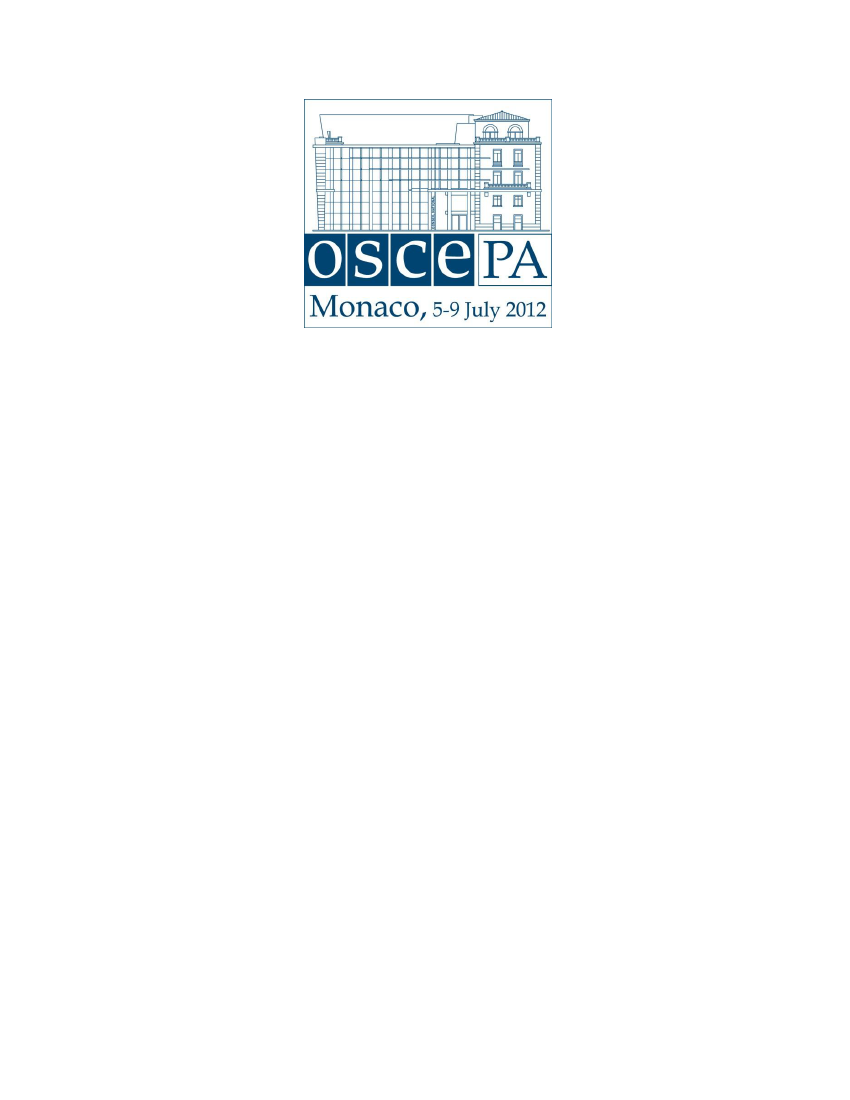OSCEs Parlamentariske Forsamling 2011-12
OSCE Alm.del Bilag 45
Offentligt
AS (12) D E
MONACODECLARATIONANDRESOLUTIONSADOPTED BY THEOSCE PARLIAMENTARY ASSEMBLYAT THE TWENTY-FIRST ANNUAL SESSION
MONACO, 5 to 9 JULY 2012
Table of ContentsPreamble1st Committee Resolution: Political Affairs and Security2nd Committee Resolution: Economic Affairs, Science,Technology and the Environment3rd Committee Resolution: Democracy, Human Rights andHumanitarian QuestionsResolution on UkraineResolution on Rule of Law in Russia: Case of Sergei MagnitskyResolution on Equal Participation of Women in OSCE Decision-makingResolution on Gender and Minorities in the OSCE RegionResolution on Strengthening Security in the OSCE RegionResolution on the Development of OSCE Co-operation with Afghanistanby 2014 and beyondResolution on MoldovaResolution on the OSCE and Emerging Democracies in the Arab WorldResolution on Iran’s Nuclear ProgrammeResolution on the Situation in GeorgiaResolution on Enhancing Cross-border Co-operation Policiesin Post-Conflict ScenariosResolution on Helsinki +40Resolution on Countering Violent Extremism and Radicalizationthat Lead to TerrorismResolution on the Impact of Small States in the OSCEResolution on Support for the United Nations Global Counter-Terrorism StrategyResolution on Promotion and Use of New and Renewable Sources of EnergyResolution on Sharing Expertise in Reclaiming Water Resourcesin Order to Strengthen Global Food SecurityResolution on Assistance for Children in the Aftermath of Crisis SituationsResolution on the Freedom of Movement in the OSCE RegionResolution on Protecting Vulnerable Populations from Human TraffickingResolution on BelarusResolution on Addressing Racism and Xenophobia Affecting Peopleof African Descent in the OSCE RegionResolution on Extraordinary Rendition InvestigationsResolution on Improving Election Observation in OSCE Participating StatesResolution on Transnational Fugitive Offenders1181217202325283033363941434546495053565860626467707374
PREAMBLE
We, Parliamentarians of the OSCE participating States, have met in annual session in Monaco on5 to 9 July 2012 as the Parliamentary dimension of the OSCE to assess developments andchallenges relating to security and co-operation, in particular on The OSCE: Region of Change,and we offer the following views to the OSCE Ministers.We wish every success to the next OSCE Ministerial Council and bring to its attention thefollowing declaration and recommendations.
THE OSCE: REGION OF CHANGE
CHAPTER IPOLITICAL AFFAIRS AND SECURITY
1.
Recalling past OSCE PA resolutions on security-related issues, reform of the OSCE, andincreasing the co-operation between the OSCE’s executive structures and theParliamentary Assembly, as well as the Astana Commemorative Declaration and therelevant 2011 Vilnius Ministerial Council Decisions,Reaffirming that security begins with the inherent dignity of the individual andrecognizing that the OSCE comprehensive approach to security remains a key concept forsuccessfully addressing the security challenges of the twenty-first century,Stressing the indispensable contribution of the OSCE to the establishment of unique armscontrol and confidence-building regimes in the area from Vancouver to Vladivostok,Welcoming the decision to reissue the Vienna Document and regretting that consensuscould not be reached on more substantial political agreements, and urging continuedefforts to further update and modernize the Vienna Document under the “ViennaDocument Plus” procedure,Encouraging continued efforts to further improve the implementation of the Code ofConduct on Politico-Military Aspects of Security, efforts in the field of arms controlagreements and confidence- and security-building measures, efforts to support regionalimplementation of UN Security Council resolution 1540 in accordance with the Forumfor Security Co-operation’s mandate, and efforts in other areas,
2.
3.
4.
5.
3
6.
Regretting that several participating States have moved further away from implementingtheir OSCE commitments, and reiterating that dealing with and strengthening activities inthe sphere of national security should not be done at the expense of human rights anddemocracy,Expressing deep regret that unresolved conflicts still exist in the OSCE area, leading tothe emergence of new tensions and triggering further human suffering, as well ashampering socio-economic development and prospects for prosperity,Being aware of the negative impact that the financial crisis is exerting on the securityenvironment and the limitations it has put on national and international efforts aimed ataddressing risks and challenges to our common security as well as on strengthening theOSCE capacity in that area,
7.
8.
The OSCE Parliamentary Assembly:9.Urges OSCE participating States to fully implement the provisions of the ViennaDocument 2011 in the whole area of its application as well as to continue to update thisDocument with a view to further increasing military transparency and predictability,including through measures such as lowering the thresholds at which States are obliged toinform each other of their military exercises, increasing the opportunities for verificationactivity, modernizing the exchange of military information, strengthening risk reductionmechanisms and enlarging the scope of confidence- and security-building measures;Calls for a new start to the negotiations on the Treaty on Conventional Forces in Europe(CFE) and strongly encourages all States parties to this Treaty to honour their obligationsunder this regime, in particular the principle of host nation consent, which determines theconditions for military deployments on the territories of other States parties in the zone ofapplication;In this regard, stresses the importance of the principle of territorial integrity, and calls onparticipating States to refrain from organizing exercises or events on foreign groundwithout the previous consent of the host nation;Calls on all parties involved in unresolved conflicts to intensify their efforts to generatepeaceful and viable solutions;Calls on all OSCE participating States to contribute to the success of the United NationsConference on the Arms Trade Treaty (ATT), which is being held in New York until 27July 2012;Underlines that uncontrolled and unregulated arms trade is a grave threat to peace,security and stability at the local, national, regional and international levels as well as todemocracy, the rule of law and sustainable social and economic development, and recallsfurthermore that unregulated arms trade contributes to armed conflicts, populationdisplacement, organized crime and terrorism;
10.
11.
12.
13.
14.
4
15.
Reaffirms that systematic violations of human rights and fundamental freedoms whichcurrently take place in some OSCE participating States, in combination with an absenceof strong democratic institutions and deviations from the rule of law, represent a seriousthreat to security and stability;Emphasizes the importance of monitoring the implementation by participating States oftheir human dimension commitments during all phases of the conflict cycle, and calls onthe OSCE Ministerial Council to strengthen an implementation review function withinthe OSCE;Calls for a comprehensive and timely implementation of the Vilnius Ministerial CouncilDecision on “Elements of the Conflict Cycle, Related to Enhancing the OSCE’sCapabilities in Early Warning, Early Action, Dialogue Facilitation and MediationSupport, and Post-Conflict Rehabilitation”;Encourages national parliaments in conflict areas to take an active role in reconciliationefforts and in informing and convincing the electorate of the need to work towardscompromise to reach peace;Recalls United Nations Security Council resolution 1325 on women, peace and security,and urges participating States to continue to promote the active participation of womenduring all phases of the conflict cycle;Urges an immediate implementation of the 2010 OSCE PA Oslo Declaration with regardto facilitating the voluntary return in safety and dignity of all refugees and internallydisplaced persons from the 2008 war in Georgia;Urges all participating States to use instruments of the economic and environmentaldimension as confidence-building measures in order to establish and strengthen co-operation between parties in conflict areas, in particular cross-border co-operationprogrammes and experiences, and to intensify their efforts towards early peacefulsettlement of protracted conflicts;Emphasizes the importance of political pluralism in national politics, particularly withinparliaments, and urges participating States to ensure the democratic right of politicalparties to stand for election in a free and unhindered way to promote multi-party systems;Calls on the President of the OSCE PA to appoint a Special Representative for CentralAsia, strengthening the post's mandate to include political party development andreinforcing the oversight role of parliaments in the region;Calls on the OSCE to deepen contact and co-operation with Afghanistan and to helpstrengthen ties between Afghanistan and the Central Asian States in order to address thesecurity challenges and the risk of spill-over, especially in light of the plannedwithdrawal of the International Security Assistance Forces (ISAF) from Afghanistan;
16.
17.
18.
19.
20.
21.
22.
23.
24.
5
25.
Calls on the OSCE to undertake the necessary internal reforms to enable an effectiveresponse to the new security related environment whilst reflecting current financialrestrictions:i.Reiterates its call for the OSCE to develop multi-year programmatic planning topursue longer-term strategies for its activities;Repeats its recommendation for the modification of the consensus rule fordecision-making with regard to decisions related to personnel, budget andadministration issues;Repeats its call for the OSCE to adjust the existing periods of service with the aimof improving continuity and retention of institutional memory;Again stresses the important role of the OSCE Institutions and field operationsand the need to ensure that the necessary resources are available for theirmandated activities;Urges the OSCE Secretary General to fulfil the 2004 OSCE Gender Action Planfor the Promotion of Gender Equality, which includes increased representation ofwomen as heads and deputy heads of OSCE field missions as well as in theleadership of OSCE institutions;Renews its call for the re-opening of an OSCE presence in Belarus as well as inGeorgia based on a status-neutral agreement;Encourages the OSCE to improve co-ordination between the Secretariat,Institutions and field operations, in order to avoid duplication and maximizeefficient utilization of resources;Welcomes the establishment, within the OSCE Secretariat, of a Departmentaddressing Transnational Threats and reiterates its support for the OSCE activitiesin this field;Calls for the OSCE to organize an exchange of views and best practice onconfidence- and security-building measures, including in the area of cybersecurity and counter-terrorism, with a view to exploring the possibility of buildingnew OSCE commitments;Calls on the OSCE to adopt the strategic framework for police-related activitiesbased on promotion of democratic policing principles that was developed byOSCE participating States under the Lithuanian OSCE Chairmanship during 2011;
ii.
iii.
iv.
v.
vi.
vii.
viii.
ix.
x.
26.
Requests the OSCE Ministerial Council at its December meeting, or the final meeting ofeach Chairperson-in-Office, to approve for submission to the OSCE PA and National
6
Parliaments a report of the work of the outgoing Chairperson-in-Office in order toenhance the ability of the OSCE PA to be better advised of the activities of the OSCE,and to send the same to National Parliaments and National delegations of the OSCE PA intime for consideration by the OSCE PA at its next Winter Meeting.
7
CHAPTER II
ECONOMIC AFFAIRS, SCIENCE, TECHNOLOGY AND THE ENVIRONMENT
27.
Recognizing that governments are carrying out painful policies to curb soaring publicdeficits and counter the effects of the European sovereign debt crisis,Disturbed by the impact of credit rating agencies on the formulation of economic andfinancial policies, and welcoming the reforms discussed in the European Parliament toreduce reliance on agency ratings, and eliminate conflicts of interest that could influencethem,Noting that governmental responses to the economic crisis have often bypassed politicaldebate and reduced the overall effectiveness of parliamentary oversight in OSCEparticipating States,Concerned that important economic policy decisions are being made within some OSCEparticipating States by technocrats without meaningful input from the people mostdirectly affected or their elected representatives in parliament,Concerned by the negative effects of the austerity policies implemented across the OSCEregion, in particular cuts targeting healthcare and education budgets, and observinggrowing evidence of a stagnant growth scenario,Acknowledging that the Institute of International Finance (IIF) has underlined thatausterity is “excessive when carried out across the board,” and encouraged governmentsto move beyond strict fiscal discipline to “avoid the risk of an austerity overload” on theworld economy,Stressing the central role of innovation and entrepreneurship, as generators of growth andemployment, in efforts to achieve economic recovery,Realizing that there is a weakness in the Shareholder Companies model, which becomesapparent when a shareholder company buys shares in another company and so on,allowing money to circulate and enabling insiders to create non-existent capital thatartificially inflates equity with no real money,Understanding the likely role of the phenomenon mentioned in the previous paragraph inthe 2008 collapse of the Icelandic economy and pointing out that it is widely used aroundthe world,Noting with concern the most recent EU data which indicates that unemployment in theEurozone has reached an all-time high, and emphasizing that excessive levels ofunemployment restrain the long-run growth potential of the economy,
28.
29.
30.
31.
32.
33.
34.
35.
36.
8
37.
Recognizing that those bearing the cost of economic failure often tend to be the mostvulnerable members of society, including women, the young and the elderly, peoplebelonging to national minorities, and migrants,Recalling the benefits of promoting women’s economic autonomy for the prosperity oftheir families and countries, which is achieved by way of facilitating access to education,training, child care, credit and financing, and legal services, as well as by initiating andimplementing legislation and programmes related to pay equity and employment,particularly in non-traditional sectors,Alarmed by mounting social unrest across the OSCE region and recalling once more theinterrelationship between economic hardship and political extremism, nationalism, andxenophobia,Pointing to the urgent need for governments to live up to their commitments regardingclimate change and step up efforts towards the finalization of a post-Kyoto legallybinding treaty to address global warming effectively by 2015,Mindful that several international organizations, most notably the United Nations and theOrganization for Economic Co-operation and Development, have underlined that theeconomic crisis presents an opportunity to encourage greater green investments as a wayto sustain the recovery,Noting that training policies have a major role to play within the global framework ofrealizing green growth and achieving economic recovery, and aware that the economiccrisis has triggered changes in the global demand for skills, whereby knowledge-basedindustries require increasing levels of education,Stressing that governmental support is essential to drive innovation, foster scientificco-operation, and generate new economic solutions to support growth in the OSCEregion,Welcoming the discussions on “Fostering Economic Co-operation and Stability in theOSCE Region” held during the OSCE Parliamentary Assembly’s Economic Conferencein Batumi,Supporting the role of the OSCE Co-ordinator for Economic and EnvironmentalActivities in promoting deeper economic co-operation between participating States,thereby contributing to the achievement of peace, prosperity and stability in the OSCEarea,Welcoming the decision to hold an Economic and Environmental DimensionImplementation Meeting on an annual basis, with the aim of improving theimplementation of OSCE commitments and the effectiveness of its work in the economicand environmental dimensions,
38.
39.
40.
41.
42.
43.
44.
45.
46.
9
47.
Noting that gender equality is not only a crucial human rights issue, but also a question ofsmart economics,Stressing that when women take a greater part in society there are clear improvements forthe public good and less corruption,
48.
The OSCE Parliamentary Assembly:49.Calls on parliamentarians of OSCE participating States to play a greater role inoverseeing and debating the economic policies implemented by governments across theOSCE region;Stresses that the necessary return to balanced budgets must be credible and bearable,excessive austerity being economically counter-productive, destructive for the mostvulnerable members of society and destabilizing for democracy;Is convinced that peoples will accept a recovery effort only if the burden is fairly shared,in particular by requiring a contribution from the financial sector, which continues toevade its responsibilities;Supports a reform of the credit rating system to encourage greater transparency andreduce possibilities for financial speculation;Encourages parliamentarians of OSCE participating States to discuss ways to decreasethe frequency of short-term market trading through the implementation of a Tobin tax;Calls on the OSCE participating States to urgently review their corporate legislation toidentify whether it allows the circulation of money to create non-existent capital and ifso, to introduce the necessary legislative amendments;Calls upon the OSCE participating States to further increase support to small and mediumenterprises (SMEs) through adequate policies that will facilitate their access to financing,reduce administrative hurdles and support SME’s access to new markets;Encourages governments of OSCE participating States to carefully analyse the long-termeffects of austerity-driven budget cuts, in particular with regard to healthcare andeducation budgets;Emphasizes that the opportunity cost of stagnant growth and high unemployment has anegative impact on the solvency of social funds, reduces the possibility of carrying outstrategic investments, and undermines the future prosperity of the OSCE region;Encourages the Governments and parliamentarians of the OSCE participating States toapply a gender-based analysis of the long-term effects of austerity-driven budgets andeconomic stimulus initiatives;
50.
51.
52.
53.
54.
55.
56.
57.
58.
10
59.
Recommends that the OSCE offers itself as a leading international organization to fostereconomic co-operation and encourage synergies among participating States, andencourages once more governments to consider the economic and environmental area ofthe OSCE’s work as one of the most promising from the standpoint of their long-terminterests;Calls upon the Ukrainian Chairmanship of the OSCE in 2013 and the Office of the OSCEEconomic and Environmental Co-ordinator to highlight alternative solutions to tackle theeconomic crisis in the OSCE area at the Twenty-first Annual OSCE Economic andEnvironmental Forum and its preparatory conferences in 2013;Supports the work of the United Nations and the Organization for EconomicCo-operation and Development to raise awareness among policymakers about theeconomic opportunity of green growth;Calls for increased international capital investment in the green economy, for developingand encouraging the wider dissemination of energy-saving technologies and renewablesources of energy, as well as the adoption of environmentally acceptable methods ofworking, with a view to promoting a post-crisis economic recovery, and also calls for thepromotion of the establishment of global machinery under the aegis of the United Nationsto make technologies for new and renewable sources of energy more accessible todeveloping countries and to countries with transition economies;Underlines that education and training policies are essential to combat unemployment,positively adapt the workforce of participating States, and retain a competitive edge intomorrow’s economy;Calls upon the parliaments of OSCE participating States to debate measures favouringgreater labour mobility;Calls on the participating States of the OSCE Parliamentary Assembly to increasewomen’s influence in their societies in order to strengthen their role as political andeconomic actors.
60.
61.
62.
63.
64.
65.
11
CHAPTER III
DEMOCRACY, HUMAN RIGHTS AND HUMANITARIAN QUESTIONS
66.
Considering that OSCE participating States in the Helsinki Final Act of 1975 haveacknowledged that respect for human rights and the fundamental freedoms of the HumanDimension are an essential factor for the peace, justice and well-being necessary toensure the development of friendly relations among themselves,Reiterating the need for a balanced approach to all three dimensions: politico-military,economic and environmental, and human,Noting that in the Madrid Concluding Document of 1983 participating States haveexpressed that the principles of the Human Dimension should be respected and put intopractice by every participating State, irrespective of their political, economic or socialsystems, as well as of their size, geographical location or level of economic development,Recalling that the OSCE region has seen change on an historic scale since 1975, but thatall OSCE principles and commitments, without exception, have been categorically andirrevocably reaffirmed in the Astana Commemorative Declaration of 2010,Recalling that at the UN Beijing Conference in 1995, women’s rights were recognized asde factoandde jurehuman rights,Stressing that the Heads of State and Government in Astana expressly stated that thecommitments undertaken in the field of the Human Dimension are matters of direct andlegitimate concern to all participating States and do not belong exclusively to the internalaffairs of the State concerned,Pointing out that in 2012 human rights are still routinely violated in many OSCEparticipating States and that many of them do not observe their commitments in theHuman Dimension,Acknowledging that, as mentioned in the 2010 Astana Commemorative Declaration,more must be done to ensure full respect for and implementation of the core principlesand commitments undertaken by the OSCE participating States in the politico-military,economic-environmental and human dimensions, notably in the sphere of human rightsand fundamental freedoms,Stressing that OSCE human rights standards are minimum standards,
67.
68.
69.
70.
71.
72.
73.
74.
12
75.
Taking the view that, notwithstanding many positive developments in many areas, inrecent years in some respects and in some participating States the commitment to OSCEprinciples in the Human Dimension has regressed and that overall this Dimension is notstrong enough,Recalling the reference in the 1975 Helsinki Final Act to the 1948 United NationsUniversal Declaration of Human Rights, specifying that everyone has the right tofreedom of opinion and expression, which includes the freedom to hold opinions withoutinterference and to seek, receive and impart information and ideas through any media,regardless of frontiers, and further recalling article 10 of the European Convention onHuman Rights regarding the protection of freedom of expression and information,Recalling the Mandate of the OSCE Representation on Freedom of the Media stating thatindependent and pluralistic media are essential to a free and open society and accountablesystems of government,Considering, therefore, that it is necessary to revise and strengthen OSCE tools to providea proper, genuine form for monitoring the participating States’ compliance with humanrights commitments and that existing tools, such as the Moscow Mechanism, should bemore frequently and more effectively applied,Observing that a country which holds the Chairmanship of the OSCE can expect closerscrutiny of the way it fulfils its commitments to the OSCE’s guiding principles and thatsuch a country therefore has a particular responsibility to provide a good example withregard to respecting these commitments,Calling on the OSCE to introduce an official review mechanism to assess participatingStates for a potential Chairmanship role, including evaluation of the candidate country’simplementation of the OSCE human dimension commitments, to be carried out beforeany decision on the matter of future Chairmanship is made,Noting that with the 1990 Copenhagen Document the OSCE participating Statesrecognized the independence of the judiciary as an essential element of the HumanDimension with regard to the full expression of the inherent dignity and of the equal andinalienable rights of all human beings and that the Ministerial Council in 2005 declaredthat the right to a fair trial, the right to an effective remedy, and the right not to besubjected to arbitrary arrest or detention constitute the basis of the rule of law,Recalling that, because of the values of traditional societies, women have unequal accessto legal procedures in order to pursue justice and the protection of their rights,particularly concerning domestic violence, property ownership, and dissolution ofmarriage,
76.
77.
78.
79.
80.
81.
82.
13
83.
Recalling the Final Report of the Supplementary Human Dimension Meeting on PrisonReform of 2002, which includes comprehensive recommendations to bring conditions indetention facilities in line with United Nations legal documents like the UN StandardMinimum Rules for the Treatment of Prisoners and the UN Convention against Tortureand other Cruel, Inhuman or Degrading Treatment or Punishment and its OptionalProtocol,Mindful of the United Nations General Assembly resolutions on the Rules for theTreatment of Women Prisoners and Non-custodial Measures for Women Offenders of 16March 2011 and on strengthening crime prevention and criminal justice responses toviolence against women of 31 March 2011,Considering that the guarantee of the above-mentioned human and political rights andfreedoms is not sufficient to allow the full expression of human dignity, particularly inconflict and post-conflict situations, that the human experience of discrimination,violence and conflict cannot be remedied by political, security and economic measuresalone, and that it is also necessary to leverage moral resources to create new opportunitiesfor all human beings so as to transform antagonisms, restore dignity, rebuild trust andconfidence and repair the social fabric,Taking note of the work organized in Vienna by the Irish Chairmanship-in-Office with aview to optimizing the human dimension in the OSCE,Reaffirming that greater efforts must be made to promote tolerance andnon-discrimination and to combat extremism on racial, ethnic and religious grounds,
84.
85.
86.
87.
The OSCE Parliamentary Assembly:88.Calls on all the OSCE participating States to assume full responsibility for a completeand effective implementation of their commitments in the fields of human rights,fundamental freedoms, democracy and the rule of law;Reiterates its call on the OSCE participating States for a more frequent and effectiveapplication of existing procedures in cases of clear, gross and uncorrected violations ofOSCE commitments, including, when necessary, the Moscow Mechanism and the“consensus minus one” procedure, in accordance with the provisions contained in thePrague Document on Further Development of CSCE Institutions and Structures (30 and31 January 1992);Calls on those participating States that hold the Chairmanship of the OSCE, now and inthe future, to set the standard for exemplary observance of their commitments in theHuman Dimension and to plan for a follow-up and deepening of their commitment toOSCE standards and mechanisms for the period after their term in office;Reaffirms the absolute necessity of a functioning, independent and transparent judiciaryin fulfilling Human Dimension commitments, as the guarantee of access to justice and the
89.
90.
91.
14
right to a fair trial and the best way to safeguard against inappropriate interference withdue process of law;92.Encourages participating States to continue to strengthen the gender balance of allcomponents of the justice system, including police and judges;Recalls the Assembly's 2010 Declaration on politically-motivated notices in theINTERPOL system, and expresses concern regarding the abuse of the INTERPOL RedNotice system by participating States whose judicial systems do not meet internationalstandards;Emphasizes that there should not be any political prisoners in the OSCE area;Urges participating States to ensure that the conditions in their detention centres are inconformity with United Nations standards and to allow visits of international prisonmonitoring missions;Strongly urges the OSCE participating States and OSCE institutions to intensify theirefforts to combat violent extremist ideologies based on racial, ethnic and religiousgrounds and their manifestations in the OSCE area;Calls on those participating States that have not already done so to ratify the OptionalProtocol to the UN Convention against Torture and other Cruel, Inhuman or DegradingTreatment or Punishment;Calls on the OSCE, including the OSCE PA, to establish permanent operational linkswith the United Nations Human Rights Council and its special procedures, notably theSpecial Rapporteurs on Human Rights Defenders, on Freedom of Expression, onFreedom of Assembly and Association and on the Independence of Judges and Lawyers;Commends the work of the OSCE field missions;Urges the OSCE Ministerial Council to adopt full, effective and long-term, at least three-year, mandates for OSCE field missions that include monitoring and reporting activitiesin all spheres, including the areas of human rights and the Human Dimension;Calls on the Permanent Council to re-open the OSCE field missions in Belarus andGeorgia, whose mandates remain relevant today;Calls for closer contacts with parliaments in Central Asia, in particular the multi-partyparliament of Kyrgyzstan, including through greater and more consistent engagementwith the OSCE field presence in both Bishkek and Osh;Calls on the OSCE Chairmanship to ensure that investigations and policy preparation forswift OSCE action in situations of persistent, large-scale human rights abuse or of
93.
94.95.
96.
97.
98.
99.100.
101.
102.
103.
15
imminent threat of such violations are not held up by a veto by any one participatingState;104.Repeats its request to the OSCE Permanent Council to organize special meetings withregard to the violation of OSCE commitments in the Human Dimension, to conduct thesemeetings in a way that is open to the public, the media and civil society representatives,and to undertake in this way the continuous monitoring of the condition of human rightsand democracy in the OSCE region;Strongly encourages the participating States to support the OSCE Representative onFreedom of the Media in efforts to strengthen and implement relevant OSCE principlesand commitments;Calls on the OSCE to establish, under the aegis of the Chairmanship or other OSCEinstitutions, including the OSCE PA, a civil society advisory board, comprised ofrepresentatives of leading NGOs working on OSCE issues.
105.
106.
16
RESOLUTION ONUKRAINE1.Bearing in mind the resolutions adopted by the OSCE Parliamentary Assembly at itsAnnual Sessions in 2007 (Kyiv) and 2008 (Astana) regarding political freedoms and theholding of democratic elections,Concerned by the generally deteriorating political situation in Ukraine with regard toupholding its commitments in the field of human rights, the rule of law and democracy,and in particular the ongoing detention and incidents of mistreatment of former UkrainianPrime Minister Yulia Tymoshenko, as also expressed in statements during the mostrecent OSCE Winter Meeting,Stressing that in the 1990 Copenhagen Document the OSCE participating Statesrecognized the independence of the judiciary as an essential element of the HumanDimension with regard to the full expression of the inherent dignity and of the equal andinalienable rights of all human beings and that the Ministerial Council in 2005 declaredthat the right to a fair trial, the right to an effective remedy, and the right not to besubjected to arbitrary arrest or detention constitute the basis of the rule of law,Supporting the work of the OSCE Project Co-ordinator in Ukraine,Noting that the majority of European heads of State refused to participate in the 18thSummit of Central European countries, which was scheduled for 11-12 May 2012 inYalta (Ukraine),Closely following the criminal proceedings and convictions in connection to allegationsof abuse of office, misappropriation of funds and other charges against a number offormer government officials, including former Interior Minister Juriy Lutsenko, formerActing Defence Minister Valery Ivashchenko, former Environment Minister HeorhiyFilipchuk, and former Prime Minister Yulia Tymoshenko, as well as other seniormembers from the previous government,Taking note of the numerous shortcomings (such as,inter alia,a lack of independence ofthe judiciary, excessive recourse to, and length of, detention on remand, and inadequatelegal reasoning by the prosecution and courts in official documents and decisions) inthese criminal proceedings which may have undermined the equality of arms between theprosecution and defence as well as the possibility for the defendants to obtain a fair trialwithin the meaning of Article 6 of the European Convention of Human Rights, whichnegatively impact Ukraine’s future European integration,Welcoming the invitation from Ukrainian authorities to the OSCE and other internationalobservers to monitor the electoral process in Ukraine’s upcoming parliamentary elections,
2.
3.
4.5.
6.
7.
8.
17
9.
Reaffirming the importance for Ukraine of respecting the OSCE commitments,including the principles of transparency, equal opportunities, freedom of expression andfulfilment of the requirements of fair and free elections,
The OSCE Parliamentary Assembly:10.Calls on Ukraine to guarantee a functioning, independent, and transparent judiciary byfulfilling its OSCE Human Dimension commitments, particularly with regard to theeffective right to fair trial and the respect of the principle of equality of arms in criminalproceedings, as well as to adequate treatment of convicted persons;Reaffirms that there should not be any political prisoners in the OSCE area and calls onUkraine to free all political prisoners;Calls on the Ukrainian authorities to reinforce the position of the ombudsperson, and toensure that the post is occupied by an individual with relevant experience in humanrights;Emphasizes that Ukraine, which is going to hold the Chairmanship of the OSCE, has aparticular responsibility to provide a good example with regard to respecting thesecommitments;Urges Ukraine to resolve these issues of rule of law, human rights and democracy, in linewith its OSCE Human Dimension commitments, before taking over the OSCEChairmanship in 2013;Calls on Ukraine to amend its Criminal Law and its Constitution if necessary in order toavoid the existence of politically motivated trials, and specifically to revise articles 364and 365 of the Criminal Code of Ukraine in line with the Council of Europe’s standards,as well as to reform the Prosecutor’s Office, devolving its excessive powers to otherrelevant institutions;Urges the Ukrainian authorities to ensure the health and guarantee the medical treatmentof a number of former government officials currently in prison, including Lutsenko,Ivashchenko and Tymoshenko, and to allow, without preconditions, medicalexaminations and, if necessary, treatment by independent doctors outside the prison andoutside Ukraine;Expects Ukraine to live up to its OSCE commitments for democratic elections byensuring that all political forces and political leaders, including those who areimprisoned, are able to take part in the upcoming parliamentary elections scheduled for28 October 2012 in a free and fair environment;Recommends that the Parliament of Ukraine avoid making changes in the legislation onparliamentary elections shortly before election day;
11.
12.
13.
14.
15.
16.
17.
18.
18
19.20.
Expects that the upcoming parliamentary elections will again meet OSCE standards;Calls on OSCE participating States, as well as other relevant international institutions, toparticipate fully in the election observation mission in Ukraine on 28 October 2012.
19
RESOLUTION ONRULE OF LAW IN RUSSIA: CASE OF SERGEI MAGNITSKY1.Supporting the Russian people in advancing democracy, human rights, and the rule oflaw,Noting that the Russian Federation has ratified the Convention against Torture and OtherCruel, Inhuman or Degrading Treatment or Punishment, the International Covenant onCivil and Political Rights, and the United Nations Convention against Corruption,Recalling that the Russian Federation is bound by the legal obligations set forth in theEuropean Convention on Human Rights,Considering the case of Sergei Magnitsky, a Russian lawyer, who was falsely arrested onpolitically-motivated charges, tortured and killed in a Russian prison on 16 November2009,Noting the context of the second trial, verdict, and sentence against former Yukosexecutives Mikhail Khodorkovsky and Platon Lebedev, which demonstrate a negativetrend in the right to a fair trial and the independence of the judiciary in the RussianFederation,Further noting the context of many unresolved human rights cases, such as the murder ofprominent journalist Anna Politkovskaya, human rights defender Natalya Estemirova andlawyer Stanislav Markelov and many other unresolved cases of extrajudicial killings andother gross human rights violations in the Russian Federation,Recalling the numerous statements and initiatives of former Russian Federation PresidentMedvedev on the need to battle corruption and impunity, as well as the need to supportthe rule of law in his country,Affirming that the harassment and torture of Sergei Magnitsky was and remainspolitically motivated,Noting that Sergei Magnitsky was repeatedly denied medical attention despite 20 writtenrequests, and further noting that when he was finally taken to a medical unit, rather thanbeing treated he was beaten with rubber batons by eight prison guards,
2.
3.
4.
5.
6.
7.
8.
9.
20
10.
Acknowledging the 2011 conclusions of an investigation conducted by former RussianPresident Medvedev’s Human Rights Council, which declared that Sergei Magnitsky’sarrest and detention were illegal and that he was denied access to justice by the courts andprosecutors, and noting that the Council also concluded that Mr. Magnitsky wasinvestigated by the same law enforcement officers whom he had accused of stealing andtax fraud, and that Mr. Magnitsky’s prison conditions amounted to torture and led directlyto his death,Regretting that the Russian Ministry of Interior and General Prosecutor’s Office haverejected the findings of the Human Rights Council as inadmissible, exonerated theofficers involved, re-opened the case against Mr. Magnitsky nearly two years after hisdeath, and assigned the same officers who had persecuted Mr. Magnitsky to call hismother and widow for interrogation,Reaffirming that it is the responsibility of the State that keeps a person in detention toprotect this person’s life or health,Deploring that state officials operated with impunity with regard to this case,Acknowledging that human rights and rule of law are at the foundation of internationalorder,Reiterating that the protection of human rights is not solely the internal issue of asovereign state,Acknowledging that good governance and anti-corruption measures are essential forsustainable economic growth, as well as for the protection of human rights,Confirming that systematic corruption erodes trust and confidence in democraticinstitutions and rule of law,
11.
12.
13.14.
15.
16.
17.
The OSCE Parliamentary Assembly:18.Supports the legislative initiatives on the Magnitsky case in the Parliamentary Assemblyof the Council of Europe, and in the national parliaments of the United States, UnitedKingdom, Canada, the Netherlands, Poland, Italy, Sweden, Germany, France, Estonia,Lithuania, Czech Republic, Spain, Portugal and Georgia, as well as the resolutions of theEuropean Parliament;Commends the recent initiative of the UK Foreign Office to ban the entry into the countryof foreign nationals who have committed human rights abuses, and to freeze the assets ofthese individuals;Welcomes the decision of the US State Department, the UK Foreign Office and the DutchParliament in 2011 to impose visa bans on some 60 Russian officials believed to beinvolved in the death of Sergei Magnitsky as a result of the Russian authorities' inaction;
19.
20.
21
21.
Calls on participating States to develop and apply targeted anti-corruption measuresblocking the property of transnational criminal organizations involved in gross humanrights violations relating to the case of Sergei Magnitsky;Deplores the fact that Mr. Magnitsky is now the subject of Russia’s first ever posthumousprosecution, and the ongoing persecution of his mother and family members;Declares that the systematic abuse of Sergei Magnitsky, including his repressive arrestand torture in custody by the same officials that Mr. Magnitsky had implicated in theembezzlement of funds from the Russian Treasury and the misappropriation of threecompanies from Mr. Magnitsky’s client, demonstrated the link between corruption andthe erosion of human rights protection;Calls on national parliaments to take action to impose visa sanctions and asset freezes onpersons responsible for the false arrest, torture, denial of medical care and death of SergeiMagnitsky, and for the conspiracy to defraud the Russian Federation of taxes oncorporate profits through fraudulent transactions and lawsuits against legitimatebusinesses, and to take action against those officials who participated in the cover-up ofall the above-mentioned crimes and of other gross violations of human rights in theRussian Federation;Urges participating States to further develop legislation to protect whistleblowers acrossthe OSCE area;Calls on participating States to place targeted sanctions on individuals responsible forgross human rights violations against people seeking to expose illegal activity by Russianofficials;Supports the European Parliament’s resolutions calling on the European Union MemberStates to consider imposing an EU entry ban for Russian officials involved in this case,and encourages EU law enforcement agencies to co-operate in freezing bank accountsand other assets of these Russian officials in all EU Member States;Encourages the OSCE participating States to keep such visa ban and asset-freeze listsopen to the public, informing those affected in due time, and allowing them due processas far as possible, in line with the best practices developing in the EU and the Council ofEurope;Encourages the Russian authorities to co-operate with international institutions ininvestigating Mr. Magnitsky’s death in custody and to issue a public report.
22.
23.
24.
25.
26.
27.
28.
29.
22
RESOLUTION ONEQUAL PARTICIPATION OF WOMEN IN OSCE DECISION-MAKING1.Recognizing that equal opportunities for women and men and the protection of theirhuman rights are essential to peace, sustainable democracy, economic development andtherefore to security and stability in the OSCE region,Recalling the 2004 OSCE Action Plan for Gender Issues, the Beijing Platform for Actionand the UN Security Council resolution 1325 (2000), which calls for full and equalparticipation of women in decision making with regard to conflict prevention as well asin post-conflict reconstruction, and stressing the importance of women’s full and equalparticipation and involvement in all efforts for the maintenance and promotion of peaceand security,Noting that there are fewer women in the national OSCE PA delegations, as well as fewerwomen in higher office within the OSCE PA, than there are men,Noting that elections in themselves still do not guarantee high-level leadership positionsfor women,Noting that women’s involvement in the process of making important governmentdecisions can be an important milestone on the path to achieving gender balance in seniorpositions,
2.
3.
4.
5.
The OSCE Parliamentary Assembly:6.Recognizes the equal rights of men and women to be heard and taken into account in theinternal proceedings of the OSCE;Regrets that gender issues are still not visible on the political agenda of the OSCE;Urges the OSCE Secretary General, Heads of Institutions and Heads of Missions as day-to-day managers within the Organization to increase efforts to promote a more gender-equal working environment within the OSCE in order to set an example for all levels ofsociety in participating States;Urges the OSCE Parliamentary Assembly to develop a project to prepare leaders amongfemale MPs;Strongly urges national Parliaments to ensure gender-balance in the composition of theDelegations to the OSCE Parliamentary Assembly, and demands representation of bothgenders in all delegations;
7.8.
9.
10.
23
11.
Calls on participating States to co-operate and exchange experiences on the developmentof legislation on special measures to promote gender balance;Urges the OSCE Secretary General, Heads of Institutions and Heads of Missions toensure that all proceedings take place in an environment, including lodgings, which isfree from prostitution and pornography;Further urges the OSCE Secretary General to aspire to representation of both genders inall on-stage proceedings within the Organization;Urges the OSCE Secretary General to enhance transparency in the meeting procedure byensuring a public speakers’ list;Further urges the OSCE Parliamentary Assembly to aspire to representation of bothgenders in all on-stage proceedings within the OSCE Parliamentary Assembly.
12.
13.
14.
15.
24
RESOLUTION ONGENDER AND MINORITIES IN THE OSCE REGION
1.
Reaffirming that equal opportunities for women and men, and the full and equalenjoyment of their human rights by women, as well as respect for the rights of personsbelonging to national minorities as universally recognized human rights, are essential topeace, justice, sustainable democracy, economic development and prosperity and,therefore, to security and stability in the OSCE region,Acknowledging the cross-cutting issue of gender and minority status, and the conditionof women belonging to national, religious, linguistic and ethnic minorities, notablyimmigrant, indigenous and Roma and Sinti women, in the OSCE region as among themost vulnerable to political, economic and social alienation,Recalling that in theFinal Actof the Conference on Security and Co-operation in Europe,the OSCE participating States committed themselves to respect “human rights andfundamental freedoms ... for all without distinction as to race, sex, language or religion,”as also confirmed by the OSCE PA in numerous declarations,Commending the work of the High Commissioner on National Minorities, the SpecialRepresentative of the OSCE Chairperson-in-Office on Gender Issues, and the GenderUnit at the OSCE Secretariat in promoting awareness and best practice concerning themost vulnerable groups in the OSCE region,Noting the progress achieved on the part of many participating States regarding theimplementation and enforcement of rights of persons belonging to national minorities,ethnic, religious and linguistic groups, indigenous peoples, immigrants, and the Romaand Sinti populations in the OSCE region, as well as on improving gender equality,Recognizing the bridging role that women can play in promoting mutual understandingand tolerance in societies characterized by national, ethnic, religious and linguisticdiversity,Mindful that in the OSCE region women who belong to minorities are less likely toparticipate fully in the economic, social, cultural and political lives of their countries, areless likely to have access to education and employment, housing, health care services,judicial protection or electoral office at a level equal with men belonging to their group,and with non-minority women and men, and are more vulnerable than men to subsequentpoverty, exploitation, trafficking, slavery, domestic and societal violence, and the lack oflegal protection as migrant workers,Aware that more fully harnessing a country’s diversity will strengthen its economicproductivity and competitiveness,
2.
3.
4.
5.
6.
7.
8.
25
9.
Concerned that women belonging to minority groups face multiple and intersecting formsof discrimination and that the cross-cutting theme of the specific plight of womenbelonging to minorities is inadequately addressed at the OSCE,Recalling the 1948 United Nations Universal Declaration of Human Rights, in particulararticle 26, which states that “Everyone has the right to education”, and the Convention onthe Elimination of All Forms of Discrimination against Women, in particular article 10,which states that “States Parties shall take all appropriate measures to eliminatediscrimination against women in order to ensure to them equal rights with men in thefield of education”,
10.
The OSCE Parliamentary Assembly:11.Calls upon the participating States to continue to increase their efforts to safeguard andpromote equal opportunities for women belonging to national minorities, particularlyregarding access to education, shelter, health services, and employment, and offersensitivity training where women and minorities are concerned;Stresses the need for national parliaments to ensure that national legislation protects,respects and fulfils the equal rights and freedoms of minorities and women;Calls on participating States to enhance their capacity for reliable collection, analysis anddissemination of sex-disaggregated data and research on ethnic, linguistic and religiousgroups, national minorities, indigenous peoples, and the Roma and Sinti populationsaccording to standardized methodology, and to consider issuing grants or other means ofsupporting non-governmental organizations to collect, analyse and disseminate sex-disaggregated data and research, for the purpose of protecting, promoting and fulfillingwomen’s rights;Encourages participating States to exchange best practice concerning gender, ethnic,linguistic and religious groups, national minorities, indigenous peoples, and the Romaand Sinti populations in order to develop more effective policies regarding their political,economic and social inclusion and identify priority areas for further capacity building;Urges participating States to increase women’s participation in negotiations to resolveconflicts and in post-conflict reconciliation efforts and governance and to provideassistance that addresses the specific needs of women, in particular minority women, asper United Nations Security Council resolution 1325, especially in those conflicts arisingfrom intolerance and where sexual violence, which has a gender and ethnic dimension,has been systematic;Calls on the High Commissioner on National Minorities, the Special Representative ofthe OSCE Chairperson-in-Office on Gender Issues, and the Gender Unit at the OSCESecretariat to strengthen their collaboration in promoting awareness of and solutions tothe challenges faced by women belonging to minority groups;
12.
13.
14.
15.
16.
26
17.
Encourages participating States to recognize the importance of education, especially forwomen, since education is the most important tool to enable them to make a livingindependently, and notes that education is a key factor for women belonging to the Romaor Sinti populations or any other minority group.
27
RESOLUTION ONSTRENGTHENING SECURITY IN THE OSCE REGION1.Reaffirming that the OSCE, as a regional arrangement under Chapter VIII of theCharter of the United Nations, as a primary organization for the peaceful settlement ofdisputes within its region and as a key instrument for early warning, conflictprevention, crisis management and post-conflict rehabilitation, continues to play animportant role in building a secure and stable OSCE community from Vancouver toVladivostok,Actively supporting the OSCE’s concept of common, comprehensive and indivisiblesecurity, which addresses the human, economic, political and military dimensions ofsecurity, and underlining the broad concept and the multidimensional approach tocommon, comprehensive, co-operative, equal and indivisible security space free ofdividing lines,Noting the change in the security environment and the emergence of new threats, andrealizing that changes to the security environment in recent years along with the unevenpace of integration, economic growth and democratic development have led to theemergence of new challenges in achieving comprehensive and equal security, which theOSCE should address,Recognizing that the security of each participating State is inseparably linked to that ofall others and constitutes the basis for stability for the OSCE area as whole,Noting further the ongoing multilateral political dialogue in the Euro-Atlantic andEurasian area on current and future security issues in the OSCE region,Welcoming the adoption of the Astana Commemorative Declaration, in particular therecommitment of the participating States to the vision of a free, democratic, commonand indivisible Euro-Atlantic and Eurasian security community,Noting the importance of inter-parliamentary co-operation including interaction amongthe parliamentary structures of key international organizations in the sphere of securitywith a view to lending greater consistency to the efforts to renew the European securityarchitecture,
2.
3.
4.
5.
6.
7.
The OSCE Parliamentary Assembly:8.Stresses that within the OSCE area no state, group of states or organization can haveany pre-eminent responsibility for maintaining peace and stability or can consider anypart of the OSCE area as its sphere of influence;
28
9.
Reaffirms the inherent right of each and every participating State to be free to choose orchange its security arrangements, including treaties of alliance, as they evolve;Acknowledges that each participating State also has the right to be free to choose not toenter or to remain out of any military or political alliance or security arrangements, andcalls on other participating States to respect such a choice and the relevant rights andavoid actions in any form or manifestation which may undermine the political,economic, security, social or cultural stability of such states;Acknowledges the legitimate interest of those participating States which choose not tobelong to any military or political alliance in receiving security assurances or effectiveinternational arrangements to this end, and welcomes unilateral or collectivecommitments in this regard, which exist and may be elaborated in future;Affirms the necessity to fully adhere to the Charter of the United Nations, the HelsinkiFinal Act, the Charter of Paris and all other agreed documents;Recognizes the primary responsibility of the UN Security Council for the maintenanceof international peace and security, and underlines the importance of implementation ingood faith of United Nations Security Council resolution 984 (1995);Stresses that participating States should not strengthen their security at the expense ofthe security of other participating States, and calls on participating States to take actionto safeguard the full implementation of the arms control and confidence-buildingregimes negotiated within the OSCE framework;Calls upon the OSCE to consider within its security dialogue the issue of strengtheningand ensuring security of participating States which do not belong to any military orpolitical alliance;Undertakes to intensify its efforts to promote the climate of confidence, trust andco-operation among the OSCE participating States with a view to upholding OSCEcommitments, strengthening comprehensive and indivisible security and contributingtoward conflict settlement;Supports efforts of the participating States to enhance the dialogue on security issues inthe OSCE area, which needs to include the issue of strengthening the security ofparticipating States that do not belong to any military or political alliance, andrecommends involving the Parliamentary Assembly in this process;Encourages the OSCE to increase upon request the sharing of its values and experiencein the security sphere beyond the OSCE area, particularly to OSCE Partners forCo-operation and neighbouring areas, while at the same time reinforcing co-operationwith the EU, the UN, NATO, the Council of Europe, the Collective Security TreatyOrganization and other relevant international and regional organizations.
10.
11.
12.
13.
14.
15.
16.
17.
18.
29
RESOLUTION ONTHE DEVELOPMENT OF OSCE CO-OPERATION WITH AFGHANISTANBY 2014 AND BEYOND1.Welcoming the implementation, for almost ten years now, of the OSCE’s co-operationwith Afghanistan, Asian Partner for Co-operation since 2003,Convinced that the long-term security and stability of Afghanistan has a direct impact onthe security of the OSCE area,Recalling Ministerial Council Decision No. 4/07 of Madrid on OSCE Engagement withAfghanistan of 2007, which enabled the OSCE to respond to Afghanistan’s request forassistance in the fields of border security, police training and the fight against drugtrafficking,Recalling the “Astana Commemorative Declaration: Towards a Security Community”,adopted by the OSCE Summit in December 2010, recognizing in particular that thesecurity of the OSCE area is inextricably linked to that of adjacent areas, notably in Asia,calling for an increase of the level of interaction with the Partners for Co-operation andunderscoring the need to contribute effectively to collective international efforts topromote a stable, independent, prosperous and democratic Afghanistan,Welcoming Ministerial Council Decision No. 4/11, Vilnius 2011, on strengthening OSCEengagement with Afghanistan, which widens OSCE engagement with Afghanistan fromthe politico-military dimension to the economic and environmental dimension and thehuman dimension,Recognizing the primary role of the United Nations Security Council in maintainingglobal security and stability and in international efforts to promote peace and stability inAfghanistan, as well as the invaluable contribution of the relevant international andregional organizations and players, and stressing the importance of co-ordinating thoseefforts and avoiding duplication,Welcoming the appeal made to the OSCE by the UN Secretary General’s SpecialRepresentative for Afghanistan and Head of the United Nations Assistance Mission inAfghanistan (UNAMA), Mr. Ján Kubiš, on 14 May 2012 in Vienna for increased OSCEco-operation with Afghanistan in various areas,Underlining the importance of an efficient transition towards a transfer to the Afghanauthorities of full responsibility for security over the whole of the Afghan territory in2014,
2.
3.
4.
5.
6.
7.
8.
30
9.
Highlighting the Afghanistan Government’s particular responsibility for the long-termsecurity and stability of the country, to be achieved in the context of a process that isAfghan-led, Afghan-owned and Afghan-driven,Affirming that the OSCE, as a regional organization implementing a comprehensiveapproach to security, notably with confidence-building measures, has the necessaryexperience and expertise for its Partners for Co-operation, in particular Afghanistan, andcan make a tangible contribution before and after 2014,Underlining the added value of the OSCE field missions, especially in Central Asia, inhelping to reinforce the security of the borders between Afghanistan and its adjoiningOSCE participating States,Welcoming theIstanbul Process on Regional Security and Co-operation for a Secure andStable Afghanistanthat was launched on 2 November 2011, recognizing Afghanistan’srole as a land bridge “in the heart of Asia” linking South Asia, Central Asia and Eurasia,to which the OSCE remains committed, and welcoming the results of its first ministerialmeeting, which took place in Kabul on 14 June 2012, in particular with regard to theapproved confidence-building measures,Welcoming the co-operation activities with Afghanistan implemented by Thailand andMongolia, Partners for Co-operation, respectively, to help Afghanistan to combat drugtrafficking and to reinforce the Afghan Ministry of Foreign Affairs,Welcoming also the invitation from the Afghan Independent Electoral Commission sentin May 2012 via the Afghan authorities to the Office for Democratic Institutions andHuman Rights (ODIHR) to present in Kabul its assessment report on the Afghan electoralprocess of 2010 and its recommendations in that regard for the upcoming presidential andparliamentary elections,
10.
11.
12.
13.
14.
The Parliamentary Assembly:15.Calls upon the OSCE participating States and other OSCE Partners for Co-operation tostrengthen their political dialogue and consultations with Afghanistan in the context of a“two-way” dialogue for a safe, stable, prosperous and democratic Afghanistan, so that itmay never again be a haven for terrorism;Calls upon the OSCE participating States and other Partners for Co-operation to increase,by 2014 and beyond, their contributions to the new co-operation projects in all threedimensions and to OSCE activities for the reinforcement of the security of the Afghanborders with its OSCE Central Asian neighbours, for the training of the Afghan police forcivil policing tasks in communities on the ground, for the fight against transnationalthreats, in particular the fight against drug trafficking and other forms of trafficking, andfor the promotion of the OSCE’s values, standards and commitments in the threedimensions, notably with the OSCE’s Border Management Staff College in Dushanbe,
16.
31
Tajikistan, the OSCE’s Academy in Bishkek, Kyrgyzstan, and in the training centres ofthe participating States and Partners for Co-operation;17.18.Encourages the OSCE to maintain a balance between political and security priorities inAfghanistan;
Calls upon the OSCE to establish a multilateral mechanism for co-operation with regionalbodies such as CICA (Conference on Interaction and Confidence Building Measures inAsia), CSTO (Collective Security Treaty Organization), SCO (Shanghai CooperationOrganisation) and CARICC (Central Asian Regional Information and CoordinationCentre) in order to support Afghanistan more effectively, and to avoid duplication ofeffort by the international community;Calls upon the participating States and Partners for Co-operation to contribute to theimplementation of the confidence-building measures developed in the context of theIstanbul Process;Encourages Afghanistan and the ODIHR to continue their co-operation and to have afruitful dialogue on strengthening the democratic electoral process in Afghanistan;Calls upon the Afghan Government to ensure inclusive and credible presidential andparliamentary elections, to strengthen independent electoral institutions and to guaranteerespect for human rights, including women's rights;Calls upon the participating OSCE States to encourage broader participation of Afghanofficials and representatives of Afghan civil society in OSCE activities, conferences andevents, with a view to a voluntary implementation of the OSCE’s standards, principlesand commitments in all three dimensions.
19.
20.
21.
22.
32
RESOLUTION ONMOLDOVA1.Recalling the previous resolutions on the Republic of Moldova of the OSCEParliamentary Assembly, adopted earlier during the Annual Sessions,Noting the recent presidential election as an important step in overcoming the politicalimpasse in the country,Recognizing that the existence of an unsettled conflict in the Transdniestrian region of theRepublic of Moldova constitutes a threat to security and stability in Europe and theOSCE area,Reaffirming the OSCE commitments to finding a solution to the Transdniestrian conflictthrough the 5+2 negotiation process,Commending the notable step in the conflict negotiations in April 2012, led by the OSCEIrish Chairmanship, in close co-operation with the Moldovan and Transdniestrianauthorities, on the principles and procedures of the talks and the future agenda of the 5+2Talks,Welcoming the establishment of joint parliamentary committees in the MoldovanParliament, envisaged to include representatives of the Transdniestrian Supreme Soviet,and expressing the hope that all political forces in the Parliament of Moldova will beincluded in these committees,Welcoming the fact that some Moldovan television broadcasters are now able to reach anaudience in the Transdniestrian region, a move that will help foster people-to-peoplecontacts from both banks of the Nistru,Regretting the closure of the Chisinau-based NIT channel, limiting political pluralism inthe Moldovan media,Reiterating the Assembly´s commitment to supporting the important work done by theOSCE Mission to Moldova,
2.
3.
4.
5.
6.
7.
8.
9.
The OSCE Parliamentary Assembly:10.Welcomes the resumption of the settlement talks in the 5+2 format, with the efforts of themediators from the Russian Federation, Ukraine and the OSCE, as well as the EuropeanUnion and the United States as observers in the settlement negotiations;
33
11.
Considers that identification of the special legal status for the Transdniestrian region inthe composition of the Republic of Moldova, while consolidating and ensuring thesovereignty, independence and territorial integrity of the Republic of Moldova within itsinternationally recognized borders, constitutes the major aim of the Transdniestrianconflict settlement process;Expresses its conviction that democratization throughout the Republic of Moldova wouldcontribute to the achievement of this aim;Calls on the Moldovan authorities to facilitate access for Transdniestrian broadcasters toMoldovan cable networks;Encourages all political forces in the Republic of Moldova to engage in a constructivepolitical dialogue;Calls on all political forces in Moldova to make genuine and concerted efforts to includethe opposition in the work of the Moldovan Parliament;Calls on Moldova to consider improving its implementation of national legislation andOSCE commitments with regard to freedom of expression;Urges the Moldovan Government and the administration of the Transdniestrian region tocontinue their efforts with regard to confidence- and security-building measures;Emphasizes that intensification of the dialogue between various institutions and publicorganizations from both sides of the Nistru River, as well as the fostering of people-to-people contacts, would help to increase mutual trust and confidence;Proposes to facilitate a parliamentary dialogue between members of the MoldovanParliament and representatives of the Transdniestrian Supreme Soviet under the auspicesof the OSCE PA Parliamentary Team on Moldova, with the support of the OSCE Missionto Moldova;Welcomes the creation and work of the Parliamentary Assembly of the Republic ofMoldova and the Republic of Poland, and encourages other OSCE participating States toestablish the broadest possible framework for interparliamentary co-operation with theRepublic of Moldova that can contribute to building political will and confidence, as wellas facilitating parliamentary dialogue;Appeals to the Russian Federation to renew and finalize the process of withdrawal of itstroops and munitions from the territory of the Republic of Moldova in accordance withrelevant principles of international law and commitments undertaken in the OSCEframework;
12.
13.
14.
15.
16.
17.
18.
19.
20.
21.
34
22.
Invites all participants in the Transdniestrian conflict settlement to undertakeconsultations with a view to transforming the current peacekeeping mechanism into amultinational civilian mission under an international (OSCE) mandate;Reiterates the readiness of the OSCE Parliamentary Assembly’s Parliamentary Team onMoldova to support peace, stability and the rule of law in the country, including throughthe support of political dialogue in the Transdniestrian settlement process.
23.
35
RESOLUTION ONTHE OSCE AND EMERGING DEMOCRACIES IN THE ARAB WORLD1.Having regard to resolution 2009 of the United Nations Security Council of16 September 2011, aimed at supporting the transitional authorities in Libya,Having regard to United Nations Security Council resolution 2043 of 21 April 2012,adopted following a compromise with Russia and providing for the deployment of 300unarmed observers in Syria,Having regard to the commendable efforts of Turkey, Jordan and Lebanon, which, asneighbouring countries to Syria, have provided facilities and assistance to Syrian citizensseeking refuge in their territories due to the mounting violence in Syria,Having regard to the Geneva Conventions of 1949 and their Additional Protocols,protecting people who are not taking part in hostilities (civilians, medical personnel,chaplains and aid workers) and those who are no longer participating in hostilities (thewounded, the sick, shipwrecked persons and prisoners of war),Having regard to resolution 1831 (2011) of the Council of Europe’s ParliamentaryAssembly of 4 October 2011, on “Co-operation between the Council of Europe and theemerging democracies in the Arab world”,Having regard to resolution 1818 (2011) and resolution 1830 (2011) of the Council ofEurope’s Parliamentary Assembly, granting the Parliament of Morocco and thePalestinian National Council “Partner for Democracy” status,Having regard to OSCE policy to promote dialogue and co-operation with the countriesand regions on the periphery of Europe, in particular by creating an OSCE ParliamentaryAssembly “Partner for Co-operation” status,Having regard to the involvement and engagement of OSCE countries in supporting thecountries engaged in peaceful democratic transition, and having regard to the experiencegained by the OSCE in democratic transition, especially in Eastern European countriesand the Balkans,Noting that democratization is a long, multileveled process that should develop fromwithin the Middle East and North African region and should reflect, above all, the will ofthe Arab countries’ peoples, while taking into account the specific nature of each of thesecountries,
2.
3.
4.
5.
6.
7.
8.
9.
36
10.
Having regard to the commendable initiative by the European Bank for Reconstructionand Development aimed at promoting and facilitating investment in countries in the Arabworld that are taking steps towards democracy and facilitating access for such countriesto European markets, in particular agricultural markets, trade, business start-ups and thecreation of infrastructure and jobs,Having regard to the tragedy affecting thousands of people in Syria and their wish for apeaceful transition to democracy,Having regard also to the tragedy of the refugees who died in the Mediterranean, whichmust not be repeated,Having regard to democratic transition in Tunisia, Egypt and Libya,Having regard to the democratic aspirations expressed by the peoples of Bahrain andYemen,Having regard to the reform of the Moroccan Constitution of 1 July 2011,Having regard, lastly, to the fact that in the absence of appropriate assistance enablingthese countries to implement peaceful democratic transition, forces that are hostile to thedemocratic process may take control and claim thousands of further victims,
11.
12.
13.14.
15.16.
The OSCE Parliamentary Assembly:17.Calls upon the Governments and Parliaments of OSCE participating States to implementall appropriate measures to ensure the success of democratic transition in the Arabcountries engaged in this process, so as to enable the people’s voices to be heard byoffering appropriate assistance to democratically elected entities that request it, inparticular by giving them the benefit of their experience in this regard;Invites OSCE participating States to engage in or strengthen dialogue with democraticallyelected forces in Arab countries so that they can develop democracy at national, regionaland local levels;Invites OSCE participating States and the authorities of the Arab countries engaged in aprocess of democratization to effectively implement democracy, the rule of law, respectfor public freedoms and human rights, and in particular gender equality, freedom of beliefand the freedom to practise any religion or none;Invites OSCE participating States and the authorities of the Arab countries engaged in aprocess of democratization to promote dialogue with each other and to deepen andbroaden their co-operation;Invites OSCE participating States to strengthen their contacts with the League of ArabStates with a view to implementing co-ordinated co-operation and providing international
18.
19.
20.
21.
37
mutual assistance for countries in the Arab world engaged in a process of democratizationthat wish to participate;22.Invites OSCE participating States and also international economic and financialorganizations to encourage and facilitate access to their internal markets for products andservices and to their financial markets for the Arab countries engaged in a process ofdemocratization;Invites OSCE participating States to develop trade with the Arab countries engaged in aprocess of democratization and foster business start-ups in these countries;Invites OSCE participating States and international organizations to foster academicexchanges between participating States and the Arab countries engaged in a process ofdemocratization to enable students from these countries to benefit from an internationalexperience and the quality of teaching offered in participating States and to enablestudents from participating States to have a better understanding of these countries’cultures;Invites OSCE participating States and the Arab States engaged in a process ofdemocratization to co-operate in order to more forcefully combat corruption, inhuman ordegrading treatment and violence, including against minorities and women, and to abolishthe death penalty where applicable;Invites OSCE participating States to take into account the positions expressed by civilsociety and to support its action to foster democracy, in particular by facilitating access toinformation, promoting freedom of expression and strengthening freedom of the press.
23.
24.
25.
26.
38
RESOLUTION ONIRAN’S NUCLEAR PROGRAMME1.Convinced that nuclear weapons remain a threat to the security of the OSCE participatingStates, and that all countries should take steps to promote a safer world by pursuing theireventual elimination,Recognizing that for more than 50 years, the international community has struggled tomake the acquisition and development of such weapons more difficult and less desirable,Convinced that the Nuclear Non-Proliferation Treaty (NPT) provides the norm and thefoundation for an international regime to prevent the spread of nuclear weapons, and hasled several states to abandon their nuclear weapons programmes or eliminate their nuclearweapons arsenal,Aware that changes in the international security environment require the strengthening ofthe NPT regime and its adaptation to the threats of the 21st century, aiming at itsuniversalization,Worried about the unresolved issues regarding the Iranian nuclear programme, includingthose which need to be clarified to exclude the existence of possible military dimensions,and the potential of nuclear proliferation in a volatile region,Concerned that the presence of nuclear weapons in the Middle East may aggravatealready deep divisions between some of the region’s states and that any escalation ofexisting tensions may lead to drastic measures with devastating consequences for theregion and the world,Commending Parliamentarians for Nuclear Non-proliferation and Disarmament (PNND)for their efforts to reduce the threat posed by nuclear weapons worldwide, in particulartheir initiative for a Middle East free of nuclear weapons and all other weapons of massdestruction,
2.
3.
4.
5.
6.
7.
The OSCE Parliamentary Assembly:8.Encourages participating States to maintain pressure on Iran in order to make the countryfully comply with its obligations under relevant conventions and resolutions of the UNSecurity Council, and to meet the requirements set by the International Atomic EnergyAgency;Calls on participating States to work for a diplomatic solution to the threat represented bythe Iranian nuclear programme;
9.
39
10.
Urges Iran to engage constructively in a process aimed at restoring internationalconfidence in the exclusively peaceful nature of its nuclear programme, while respectingthe legitimate right to the peaceful uses of nuclear energy consistent with the NPT;Underlines that countries refusing to abide by their international nuclear non-proliferationobligations must be held accountable;Calls on participating States possessing nuclear weapons to undertake further measures toreduce their arsenals as part of the global effort to enhance nuclear security;Calls on participating States to support the initiative of a Middle East free of nuclearweapons and all other weapons of mass destruction.
11.
12.
13.
40
RESOLUTION ONTHE SITUATION IN GEORGIA1.Bearing in mind the Kyiv Declaration of the OSCE PA from 2007 underlining theimportance of a resolution on conflict settlements in the OSCE area,Referring to the commitment of the former OSCE mission to Georgia aimed atfacilitating a political settlement of the tensions and conflicts on the northern frontiersand territories of Georgia,Underlining the territorial integrity and sovereignty of Georgia in the frameworkrecognized by the international community and stated in the UN Security Councilresolutions,Concerned about the humanitarian situation of the displaced persons both in Georgia andin the occupied territories of Abkhazia, Georgia, and South Ossetia, Georgia, as well asthe denial of the right of return to their places of living,Welcoming the further democratization of political life in Georgia, including the localelections on 30 May 2010, which were closer to international standards, constitutionalreform, and the process of electoral reform, including opposition parties, aimed atcreating the conditions for a free and fair upcoming Parliamentary Election in October2012 and Presidential Election in 2013,
2.
3.
4.
5.
The OSCE Parliamentary Assembly:6.Calls upon all parties involved to abide by the principles of international law, implementfully the EU-brokered ceasefire agreement and strengthen the Geneva Process, as themost comprehensive international mechanism to settle the protracted conflict and itssubsequent effects;Urges the Government and the Parliament of the Russian Federation, as well as thede factoauthorities of Abkhazia, Georgia, and South Ossetia, Georgia, to allow theEuropean Union Monitoring Mission unimpeded access to the occupied territories ofAbkhazia, Georgia and South Ossetia, Georgia as was previously agreed in the ceasefireagreement, and to co-operate fully with the EUMM;Calls for the safe and dignified return of all internally displaced persons to their places ofliving, ensuring access to international humanitarian aid when needed, with the goal ofgradual rapprochement of the societies of Georgia and Abkhazia, Georgia, and SouthOssetia, Georgia;Calls upon the OSCE participating States to re-establish the OSCE Mission to Georgia asa mechanism for confidence-building;
7.
8.
9.
41
10.
Calls on the Georgian authorities to ensure that the upcoming Parliamentary Election inOctober 2012 and Presidential Election in 2013 will be organized in line with OSCEcommitments and recommendations, especially with regard to equal conditions for allparticipants in the election process and the free and independent functioning of the media.
42
RESOLUTION ONENHANCING CROSS-BORDER CO-OPERATION POLICIES INPOST-CONFLICT SCENARIOS1.Recognizing the historic role played by the OSCE under Chapter VIII of the UnitedNations Charter in the peaceful settlement of conflicts and in the promotion of security inits area of influence,Considering its vast experience in prevention, analysis, early warning, reaction,promotion of dialogue, support of mediation, establishment of a security environment,post-conflict rehabilitation, stabilization, confidence-building and reconstruction, namely,in all stages of a crisis cycle,Recalling successive documents which have shaped the OSCE’s analysis in the field ofpost-conflict rehabilitation, from the Budapest Document of December 1994, up to andincluding the OSCE’s Strategy to Address Threats to Security and Stability in theTwenty-First Century of 2003,Fully aware of its already comprehensive range of activities in post-conflict periods, suchas the restoration of institutionality, judicial and electoral reforms, human rightsempowerment, handling of inter-ethnic conflicts, educational reforms, protection of therights of national minorities and economic recovery,In the framework of the Decision by the Ministerial Council No 3/11, Elements of theConflict Cycle, adopted in Vilnius, and the tasking of the Secretary General to draft aproposal on how to make better use of the possible contributions of theOSCE Parliamentary Assembly in developing a more effective response to emergingcrisis and conflict situations,Acknowledging the essential and specialized role played in this respect by the ConflictPrevention Centre, both in practical terms and in the reflection on these matters, by itselfand together with interested participating States,Also considering the experience of the Non-Military Confidence-Building Measures(CBMs), despite being aware of their limitations,Stressing the conflict prevention role of a border policy in which human, social andeconomic bonds represent a network of common interests that will make it difficult tobreak the peaceful status quo,Considering the crucial role of a comprehensive border policy in the final stage ofconflicts, not only from the point of view of security or delimitation, but also from that ofsocio-economic development, restoration of confidence, rebuilding of economic activity,
2.
3.
4.
5.
6.
7.
8.
9.
43
protection and, where necessary, integration of cultural or national minorities affected bythe border itself,10.Taking into account the instrumental role of local and regional authorities in realisticon-the-ground enforcement of high level international or bilateral agreements for thestabilization and normalization of the life of the peoples of post-conflict border areas,Considering the vast experience of many participating States and their administrativebodies in cross-border co-operation policies, not only within the EU political and legalframework, where 50 years’ experience has shown the legitimate role of border policiesin the regional integration process itself, but also in other bilateral or regional integrationfields, of a different scale and model but still within the OSCE’s scope,Considering likewise the experience obtained in this regard by other international bodies,such as the Council of Europe, and other specialized associations, such as the Associationof European Border Regions, which has the most comprehensive database on goodpractices concerning cross-border co-operation in all types of borders, inside and outsideEurope,
11.
12.
The OSCE Parliamentary Assembly:13.Underlines the need for wider consideration and a broader concept of the border situationin post-conflict situations within the framework of the network of the OSCE’s bodies;Calls for a definition of borders, in general terms and more particularly in the case ofthose which have been conflict scenarios, that goes beyond merely security aspects andtakes into account human development and social and economic aspects;Thus demands that the role of international institutions does not end when the direct andpresent threats of violence disappear, but when a border interconnection level has beenreached which makes it politically burdensome to resort to conflict and to the logic ofconfrontation;Also calls for a general definition of cross-border co-operation policies as a means toprevent conflicts and to legitimize economic and political integration processes, whethermultilateral or bilateral, which constitute the best guarantee in the face of temptations tosettle disputes through non peaceful means;Calls for OSCE’s post-conflict structures to take into account all the experience obtainedin the field of cross-border co-operation by participating States and by theiradministrations, as well as that of other international organizations and specializedassociations;Urges local and regional authorities to play a special role in confidence-building inpost-conflict borders, in close co-operation with national authorities, since their proximityto the directly affected peoples affords them greater political legitimacy and visibility.
14.
15.
16.
17.
18.
44
RESOLUTION ONHELSINKI +401.Welcoming the fact that the decisions regarding the presidencies in 2014 and 2015 offerthe prospect of a multi-year perspective, which allows the planning of OSCE activitiesover several years,Recalling that the OSCE will celebrate the 40th anniversary of the signing of the HelsinkiAct in 2015 and that this should be seen as an occasion to renew trust betweenparticipating States,Bearing in mind that important reforms are pending and that public funds to financeorganizations and their activities are limited,
2.
3.
The OSCE Parliamentary Assembly:4.Urges the OSCE participating States to use 2015 as an occasion to renew the vision andthe role of the OSCE in the Euro-Atlantic and Eurasian security architecture to recordprogress with the implementation of the Astana Commemorative Declaration, and to setup new milestones for the OSCE in the years to come in order to work towards a sharedgoal of a security community;Is of the opinion that the Commemorative Declaration and the draft action plan drawn upin Astana form important bases for this strategic timetable and could be complemented byfurther initiatives currently under consideration;Calls on the OSCE participating States to take constructive decisions as quickly aspossible to improve the human dimension of events, to agree on multi-year programmesand budget cycles and to consider further improvement measures in other dimensions;Calls on the OSCE participating States to tackle further important reforms such as thequestion of a constituent document for the OSCE which would fully respect the HelsinkiFinal Act, the Paris Charter and other key commitments of the OSCE, to redefine the roleof the presidency and the Secretary-General so that the organization can continue to beled effectively in future, and to set modalities to strengthen the dialogue with partnercountries and with other international organizations;Calls on the participating States to develop a strategic vision of the OSCE by 2015 inorder to address effectively the security policy challenges of the years ahead and to conferon the OSCE new important tasks in the areas of arms control, transnational threats,prevention and resolution of conflicts, human rights and human security, and to identifyfurther possible themes;Expects the Parliamentary Assembly to be suitably involved in these discussions.
5.
6.
7.
8.
9.
45
RESOLUTION ONCOUNTERING VIOLENT EXTREMISM AND RADICALIZATION THATLEAD TO TERRORISM1.Recalling its Berlin Declaration of 2002 on Confronting Terrorism as a Global Challengein the 21st century, chapter I of its Edinburgh Declaration of 2004 and chapter III of itsWashington Declaration of 2005 and its accompanying resolutions on Terrorism bySuicide Bombers and on Terrorism and Human Rights,Recalling its 2011 Resolution on Countering Violent Extremism and Radicalization thatLead to Terrorism,Noting the Ministerial Statement on Supporting the United Nations Global Counter-Terrorism Strategy of 2007, the Ministerial Council Decision No. 10/08 on FurtherPromoting the OSCE’s Action in Countering Terrorism, and the Ministerial CouncilDecision No. 2/09 on Further OSCE Efforts to Address Transnational Threats andChallenges to Security and Stability, specifically where it commends the OSCE’scontribution to countering violent extremism and radicalization that lead to terrorism,Also noting the United Nations Counter-Terrorism Implementation Task Force’s FirstReport of the Working Group on Radicalization and Extremism that Lead to Terrorism of2008,Welcoming the OSCE Chairmanship priorities for 2012, which highlight the need tofurther elaborate the OSCE’s role in countering violent extremism and radicalization thatlead to terrorism,Commending the valuable work that has been undertaken in this field by the OSCE’sexecutive structures, in particular the Transnational Threats Department/Action againstTerrorism Unit and the Office of Democratic Institutions and Human Rights (ODIHR),Stressing that terrorism cannot and should not be associated with any religion,nationality, race, civilization or ethnic group,Underlining that violent extremism and radicalization that lead to terrorism is of seriousconcern to OSCE participating States and that a necessary first step in any effective andcomprehensive counter-terrorism strategy is to prevent and counter the processes ofradicalization that lead individuals and groups to support and to resort to terroristviolence in pursuit of whatever might be their motivations and aims,Convinced that a multi-dimensional understanding of the dynamics behind violentextremism and radicalization that lead to terrorism is essential to designing andimplementing effective strategies to combat terrorism,
2.
3.
4.
5.
6.
7.
8.
9.
46
10.
Reaffirming the comprehensive approach of the United Nations Global Counter-Terrorism Strategy towards countering terrorism by addressing not only itsmanifestations, but also the conditions conducive to its spread, including but not limitedto prolonged unresolved conflicts, dehumanization of victims of terrorism in all its formsand manifestations, lack of rule of law and violations of human rights, ethnic, nationaland religious discrimination, political exclusion, socio-economic marginalization and lackof good governance, while recognizing that none of these conditions can excuse or justifyacts of terrorism,Stressing that this involves,inter alia,strengthening the resilience of individuals,communities and societies in order to prevent sympathy and support for those who inciteand resort to terrorist violence,Emphasizing the important role of national parliaments in,inter alia,addressing factorsconducive to terrorism and exercising democratic control over the security sector, as wellas adopting appropriate national legislation to prevent and combat terrorism, in line withrelevant international obligations, including international human rights law, refugee lawand international humanitarian law,Emphasizing also that effectively understanding and addressing the factors conducive toterrorism requires a multi-stakeholder and multi-dimensional approach, which upholdshuman rights and the rule of law, draws on inter-agency co-ordination and public-privatepartnerships, and combines actions at both the national and local levels,Welcoming the organization, as a joint pioneering initiative of the OSCE Secretariat andthe OSCE ODIHR, of two regional expert roundtables respectively focused on preventingwomen terrorist radicalization, and on the role and empowerment of women in counteringviolent extremism and radicalization that lead to terrorism,Taking note of the joint project of the OSCE Secretariat’s Transnational ThreatsDepartment and the OSCE ODIHR to develop a guidebook on community policing andpreventing terrorism, which aims at providing guidance on how to use police-publicpartnerships as part of an effective, human rights compliant and gender-sensitive, multi-disciplinary approach to preventing terrorism and countering violent extremism andradicalization that lead to terrorism,
11.
12.
13.
14.
15.
The OSCE Parliamentary Assembly:16.Calls upon national parliaments of OSCE participating States to advocate democratic andhuman rights values and promote pluralistic debate, as well as concrete actions to addressfactors conducive to terrorism;Strongly encourages interparliamentary exchange and action among OSCE ParliamentaryAssembly members with regard to countering violent extremism and radicalization thatlead to terrorism;
17.
47
18.
Calls on the OSCE participating States and Partners for Co-operation to actively sharegood practices and lessons learned in countering violent extremism and radicalization thatlead to terrorism, including understanding and analysing factors conducive to terrorism,design and implementation of national and local level policies and measures, anddevelopment of public-private partnership initiatives;Invites the OSCE participating States to engage with relevant OSCE executive structuresand to provide funding for the organization of roundtables and training courses onregional, sub-regional and national level approaches to countering radicalization andviolent extremism that lead to terrorism, to the benefit of counter-terrorism practitionersand other government officials, as well as civil society stakeholders;Endorses the initiative to develop a consolidated framework for OSCE counter-terrorismactivities for adoption by the OSCE participating States.
19.
20.
48
RESOLUTION ONTHE IMPACT OF SMALL STATES IN THE OSCE1.
Recalling that the Helsinki Final Act of 1975 recognizes equal rights and duties for theparticipating States,Emphasizing that small states are unique entities shaped by a long history and that theyhave a special place in Europe,Recognizing that the OSCE standards, in particular in terms of international law,democracy, the rule of law and human rights, must be observed by small participatingStates, as well as by all other participating States, regardless of their size and impact,Recognizing that maintaining and guaranteeing the security and identity of small states isessential to maintaining their sovereignty and stability,Realizing that small states have to put much more effort into maintaining their identity ina global environment, and that their different economic and social systems must berespected in their diversity,Recognizing small States' potential and readiness to make a substantial contribution tointernational issues and play a role in international organizations, to the best of theircapacities and means,
2.
3.
4.
5.
6.
The OSCE Parliamentary Assembly:7.
Welcomes the invitation of Monaco to host the Annual Session of the OSCEParliamentary Assembly in their country and the special efforts performed by a smallstate to organize an event of this calibre;Encourages all participating States to support small States in their efforts to enforceOSCE standards and to maintain their identity, to guarantee their security and theirsovereignty, to treat them on an equal basis as all the other participating States, and totake into account the constraints they face in their economic, social and environmentalpolicies;Supports small States' efforts to address common challenges and problems, which areoften related to their limited human resources, and acknowledges the importance of smallStates sharing information and experiences in order to better promote common interests,raise awareness and seek collaboration for issues of particular concern to them.
8.
9.
49
RESOLUTION ONSUPPORT FOR THE UNITED NATIONS GLOBALCOUNTER-TERRORISM STRATEGY1.Stressing its strong and unequivocal condemnation of terrorism in all its forms andmanifestations, committed by whomever, wherever and for whatever purposes, as itconstitutes one of the most serious threats to international peace and security,Rejecting firmly the identification of terrorism with any race, ethnicity, civilization,nationality or religion,Affirming that the United Nations Global Counter-Terrorism Strategy and its four pillarsprovide the overall framework for the efforts of the members of the internationalcommunity to effectively counter terrorism, in accordance with their obligations underinternational law, including the Charter of the United Nations and relevant internationalconventions and protocols, in particular human rights law, refugee law and internationalhumanitarian law,Ensuring the OSCE Parliamentary Assembly’s support for implementation of the UnitedNations Global Counter-Terrorism Strategy in an integrated manner and in all its aspects,Highlighting the OSCE’s multidimensional approach to counter-terrorism, whichcorresponds to that of the United Nations Global Counter-Terrorism Strategy,Noting the Ministerial Statement on Supporting the United Nations GlobalCounter-Terrorism Strategy of 2007, which recognized the leading role of the UnitedNations in the international efforts against terrorism and recalled the comprehensiveapproach of the Strategy towards countering terrorism by addressing not only itsmanifestations, but also the conditions conducive to its spread,Also noting the Joint Communiqué adopted at the annual high-level meeting of 2007between the Council of Europe, the Organization for Security and Co-operation in Europeand the United Nations and Partner Organizations, which welcomed the adoption of theUnited Nations Global Counter-Terrorism Strategy,Commending the valuable work that has been undertaken by the OSCE’s executivestructures in promoting the implementation of the United Nations GlobalCounter-Terrorism Strategy, in particular the Transnational Threats Department, theOffice of Democratic Institutions and Human Rights (ODIHR), and the Office ofEconomic and Environmental Activities, as well as the work of the Forum for SecurityCo-operation in the fields of non-proliferation and preventing trafficking in small arms,light weapons and ammunitions,
2.
3.
4.
5.
6.
7.
8.
50
9.
Stressing the need to further strengthen international, regional and sub-regionalco-operation to effectively prevent and combat terrorism,Emphasizing that a necessary first step in any effective and comprehensivecounter-terrorism strategy is to prevent and counter the processes of radicalization thatlead individuals and groups to support and resort to terrorist violence in pursuit ofwhatever might be their motivations and aims,Reaffirming that the promotion and protection of human rights and fundamental freedomsfor all, as well as upholding the rule of law, should be central to all international, regionaland national counter-terrorism strategies and measures, and that effectively counteringterrorism and promoting human rights are not conflicting, but complementary andmutually reinforcing goals,Emphasizing the important role of national parliaments in supporting the implementationof the Global Counter-Terrorism Strategy by,inter alia,addressing factors conducive toterrorism and adopting appropriate national legislation to prevent and combat terrorism,in line with relevant international obligations,
10.
11.
12.
The OSCE Parliamentary Assembly:13.Calls upon national parliaments of OSCE participating States to support theimplementation of the United Nations Global Counter-Terrorism Strategy;Urges national parliaments of OSCE participating States to strengthen the internationallegal framework by supporting the ratification of the international conventions andprotocols against terrorism and the implementation of their provisions;Urges national parliaments of OSCE participating States to ensure that the fight againstterrorism is conducted within a framework based on the respect for human rights,fundamental freedoms and the rule of law;Encourages interparliamentary exchange and action among OSCE ParliamentaryAssembly members in implementing the United Nations Global Counter-TerrorismStrategy;Calls on the OSCE participating States and Partners for Co-operation to actively sharebest practices and lessons learned in implementing the four pillars of the United NationsGlobal Counter-Terrorism Strategy;Calls upon OSCE participating States to implement the Strategy through consistent andlong-term efforts that draw on inter-agency co-ordination and public-private partnerships;Urges OSCE participating States to make every effort to support the conclusion of aUnited Nations Comprehensive Convention on International Terrorism;
14.
15.
16.
17.
18.
19.
51
20.
Invites OSCE participating States to review their existing and emerging counter-terrorismprogrammes and initiatives, to step up their efforts to implement the Strategy at theinternational, regional and national levels and to support the work of the United NationsCounter-Terrorism Implementation Task-Force in this regard;Calls upon the OSCE participating States to engage with relevant OSCE executivestructures and to provide funding for the organization of roundtables and training courseson regional, sub-regional and national level approaches to implement the United NationsGlobal Counter-Terrorism Strategy to the benefit of counter-terrorism practitioners andother government officials, as well as civil society stakeholders;Calls upon the OSCE participating States to adopt an OSCE Consolidated FrameworkFor The Fight Against Terrorism.
21.
22.
52
RESOLUTION ONPROMOTION AND USE OF NEW AND RENEWABLESOURCES OF ENERGY1.Recalling the provisions on energy security and co-operation contained in the OSCEParliamentary Assembly declarations and resolutions,Reiterating the call on OSCE participating States in the 2008 Astana Declaration to committhemselves to a global energy transformation towards,inter alia,renewable energy, energyefficiency, energy saving and access to energy,Welcoming the growing global awareness of the importance of new and renewable sourcesof energy,Recalling the United Nations General Assembly Resolutions 64/206 and 66/206 entitled“Promotion of new and renewable sources of energy”,Recognizing that the development of new and renewable sources of energy plays asignificant role in the attainment by the OSCE participating States of the internationallyagreed development goals, including the Millennium Development Goals,Noting that, in addition to higher energy efficiency, a greater use of new and renewablesources of energy and advanced clean energy technologies enhances the opportunities fortackling challenges caused by climate change,Welcoming initiatives that aim to improve access to reliable, affordable, economicallyviable, socially acceptable and environmentally sound energy technologies and services,Underlining the imperative to intensify research on energy technologies and in support ofenergy for sustainable development,Stressing that the wider use and exploration of available and additional new and renewablesources of energy require technology transfer and diffusion on a global scale,Noting ongoing activities related to the promotion of new and renewable sources of energywithin the United Nations system, and acknowledging the role of the UN-Energy group inpromoting system-wide co-ordination in the area of energy,Appreciating the work of the International Renewable Energy Agency (IRENA) onpromoting the diffusion and sustainable use of various forms of renewable energy,Recognizing the contribution made by other relevant regional initiatives, mechanisms andinstitutions to the efforts of the OSCE participating States to expand the use of new andrenewable sources of energy,
2.
3.
4.
5.
6.
7.
8.
9.
10.
11.
12.
53
13.
Acknowledging that the private sector and civil society could play an important role in thepromotion of renewable energy, energy efficiency, energy saving and access to energy,
The OSCE Parliamentary Assembly:14.Stresses the crucial role of energy security in the new security environment and theimperative need for fairness and transparency, in accordance with international law and theEuropean Energy Charter;Underlines that the OSCE has a comprehensive normative and organizational framework forpromoting regional and global co-operation and dialogue on energy security by raisingawareness of challenges in this field and complementing relevant efforts of other global andregional stakeholders;Urges the OSCE participating States to make efforts to develop further an enablingenvironment at various levels for the promotion and use of new and renewable sources ofenergy;Calls upon the OSCE participating States to facilitate economically viable strategiesconducive to reducing costs for new and renewable sources of energy and increasing theircompetitiveness, including through the implementation, as appropriate, of public policiesfor research, development and deployment;Calls upon the OSCE participating States and the OSCE executive structures to take furtheraction to mobilize the provision of financial resources, technology transfer, technicalassistance and capacity-building and the diffusion of environmentally sound energytechnologies;Encourages the Office of the Co-ordinator of OSCE Economic and Environmental Activitiesand other OSCE executive structures to continue to facilitate in the OSCE region a shifttowards a global energy transformation, and to raise awareness of the importance of energyfor sustainable development, including the need for the promotion of new and renewablesources of energy and the increased role they can play in energy supplies;Encourages the OSCE participating States to develop and implement measures andinitiatives, in co-operation with the private sector and civil society, to inform and educatepeople about renewable energy, energy efficiency, energy saving and access to energy;Takes note with appreciation of global, regional and national initiatives in the area of energythat promote the use of new and renewable sources of energy, energy efficiency, and accessto energy;Supports the idea of establishing under the aegis of the United Nations a global mechanismfor transfer of technologies for new and renewable sources of energy,inter alia,by means ofa global voluntary fund, a single global database, and an empowered UN-Energy group;
15.
16.
17.
18.
19.
20.
21.
22.
54
23.
Encourages the OSCE participating States to co-operate closely in transferring technicalknow-how for new and renewable energy technologies;Recommends that the OSCE holds an expert meeting with a view to sharing experience inthe field of modern energy technologies and best practice related to renewable energy,energy efficiency, energy saving and access to energy;Calls on the OSCE participating States to promote the concept of renewable energy beingused at the point of creation due to the nature of energy loss during the process oftransmission and to recognize that regionalized areas on the perimeters of Europe, whichhave the greatest capacity to produce wave, wind, tidal and solar energies, should becultivated for the peoples of these areas, where unemployment is traditionally highest,which can also be seen as a competitive advantage for the manufacturing sector.
24.
25.
55
RESOLUTION ONSHARING EXPERTISE IN RECLAIMING WATER RESOURCES INORDER TO STRENGTHEN GLOBAL FOOD SECURITY1.Considering that the status of food security is essential to the achievement of MillenniumDevelopment Goal (MDG) 1, which calls upon development actors to halve theproportion of people who suffer from hunger as well as halve the proportion of peopleliving on less than USD 1 per day,Considering that despite the expected achievement of MDG 1, hundreds of millions ofpeople will continue to suffer from chronic hunger and the situation of the impoverishedand hungry in many nations will not reflect the success of the global enterprise,Considering that the global nature of climate change and its status as an impediment tothe development of green economies demand that agricultural, energy and water sectorsbe addressed strategically with a regional perspective,Noting the serious impact of water scarcity on agriculture, particularly in developingcountries, where agriculture is a predominant economic sector, and these countries’growing dependency on food imports for their food security,Recognizing the strain that the impacts of desertification and water scarcity impose on theworld’s natural resources, which will be tasked with the challenge of feeding a globalpopulation that is expected to rise to 9 billion people by 2050,Recognizing that in order to combat water scarcity, countries with expertise inmaximizing limited natural resources must come to the aid of governments andcommunities that lack the know-how to take advantage of their own national watersupplies and may effectively do so by establishing partnerships based oncapacity-building,Recalling that the Belgrade Declaration calls for the OSCE to include food security on itsagenda and commits the OSCE to the development of energy-saving technologies andrenewable sources of energy,Stressing that global food security will remain a paramount issue to the global efforttowards sustainable development, and that food prices must remain equitable in order tomaintain the momentum of ensuring food security for all,Stressing that the role of transnational politico-military threats in the degradation of foodsecurity may constrain the extent of international co-operation and that regionalco-operation should not compromise the respect for national sovereignty,
2.
3.
4.
5.
6.
7.
8.
9.
56
10.
Expressing concern that impeded access to water resources and misuse of water resourcesamong countries sharing the same water resources constitute potential conflict threats,Taking into account the negative, destructive effects of mining on the environment and onsupplies of water resources (glaciers),
11.
The OSCE Parliamentary Assembly:12.Calls on the OSCE participating States to ensure the safety of supplies of water resources(glaciers) and to prevent contamination of the environment by toxic industrial waste;Stresses the importance of developing open lines of communication betweendevelopment actors in order to encourage parliaments, governments and civil societystakeholders to utilize and share their comparative advantages;Asks the Office of the Co-ordinator of the OSCE Economic and Environmental Activitiesto continue its efforts towards improving food security by recognizing the problems ofdesertification, water scarcity, rural and desert livelihoods, shortage of basic foodsupplies and the necessity for desalination, as well as the need to search for alternativeenergy as a means to eradicate poverty in all its work related to accomplishing theMillennium Development Goals;Invites participating States of the OSCE to share their comparative advantages in thefields of water treatment and water reclamation by engaging partners through practicalprojects, educational seminars, and the transfer of technology complemented by trainingto ensure competency in the management of such technology in locations to bedetermined based on strategic placement or convenience;Stresses the need for enhanced efforts to establish an international legal framework forresolving disputes over water resources and ensuring an equitable use of shared watersupplies.
13.
14.
15.
16.
57
RESOLUTION ONASSISTANCE FOR CHILDREN IN THE AFTERMATH OFCRISIS SITUATIONS1.Recalling previous output of the OSCE PA as well as international agreements andconventions,inter alia,the relevant protocols of the Hague and the Geneva Conventions,the Charter for Fundamental Rights of the European Union, the Convention on the Rightsof the Child, the Optional Protocol to the Convention on the Rights of the Child on theinvolvement of children in armed conflicts and the ILO Convention 182 on the worstforms of child labour,Noting that children are disproportionately affected by natural disasters and crises, whichpose a direct and serious danger to their lives and to the existence of their community oreven the whole population,Bearing in mind that children are the most vulnerable members of society, especiallywhen the crisis situation results in deprivation of family and home,Worried that during and after a crisis situation children are particularly exposed totraumatic exploitation and violations of their physical and psychological integrity,Underlining that educational activities in emergency and crisis situations can providechildren with a sense of the normality and security needed for them to grow and flourish,Stressing that the transition from humanitarian assistance towards reconstruction andsustainable development is guaranteed by education together with health care and theprovision of nourishment and water,Commending the valuable work that has been undertaken by all organizations acting inthis field,Concerned that the insufficiently targeted and co-ordinated assistance may deterioraterather than improve the situation of children,
2.
3.
4.
5.
6.
7.
8.
The OSCE Parliamentary Assembly:9.Underlines that every humanitarian action must take into account children’s specificneeds and provide them with a protective environment allowing them to survive and topursue their physical, emotional and mental development;Encourages the OSCE participating States to create targeted programmes respecting localculture and lifestyles and being part of a continuous action;
10.
58
11.
Urges the OSCE participating States to establish afterwards assistance projects necessaryto protect children’s future and enable them to contribute to the reconstruction process;Calls upon the OSCE participating States to support, in countries affected by crises,legislative, judicial and institutional reforms, especially those focused on the protectionof children against all risks;Calls upon national parliaments of OSCE participating States to support all actionsensuring both child protection and the needs of mothers, since their situation generallyhas a direct impact on the wellbeing of the children;Recommends that all supervisory bodies carry out frequent and detailed monitoring of allrelevant humanitarian actions to ensure that good co-ordination among internationalhumanitarian agencies and national and local authorities is maintained in order to providecoherent, unduplicated and effective humanitarian responses, along with increasingoperational flexibility for all parties involved in international organizations in rapidlyadapting operations to new situations.
12.
13.
14.
59
RESOLUTION ONFREEDOM OF MOVEMENT IN THE OSCE REGION1.Recalling the relevant provisions of the Helsinki Final Act (1975), the Final Document ofthe Madrid Meeting (1983), the Final Document of the Vienna Meeting (1989), theDocument of the Copenhagen Meeting of the Conference on the Human Dimension ofthe CSCE (1990), the Charter of Paris for a New Europe (1990), the Budapest Document“Towards a Genuine Partnership in a New Era” (1994), the Border Security andManagement Concept (2005) and other relevant OSCE documents,Reaffirming the provisions of the Charter of Paris for a New Europe (1990), inaccordance with which every individual has the right to freedom of movement withoutany discrimination,Reiterating that greater freedom of movement and contacts between our citizens are ofcrucial importance for the preservation and development of free societies and a thrivingculture and play an essential role in the context of protecting and promoting human rightsand fundamental freedoms,Welcoming the positive advances which have taken place over the past decades in theOSCE region in connection with the simplification of visa procedures and theliberalization of visa regimes, and welcoming the continuing efforts towards a reciprocalsimplification of visa formalities and an abolition of entry visas on the basis ofcorresponding agreements,Welcoming the initiatives of a number of CSTO Member States, in particular Armenia,Belarus, Kazakhstan, Kyrgyzstan and Russia, aimed at simplifying visa procedures, aswell as their determination to liberalize visa regimes with the OSCE participating States,Recognizing the need to continue to promote and facilitate human contacts among theparticipating States in the OSCE region,
2.
3.
4.
5.
6.
The OSCE Parliamentary Assembly:7.Urges the Governments of the participating States to meet their commitments in full withregard to freedom of movement and the promotion of human contacts;Calls upon the participating States to promote trips on an individual or group basis forpersonal or professional reasons and for tourism, in particular by further simplifying visaprocedures and reducing visa fees;
8.
60
9.
Urges the Governments of the participating States to further strengthen co-operationbetween the relevant bodies and institutions with a view to promoting greater freedom ofmovement of persons across borders and ultimately abolishing visa regimes throughoutthe OSCE space;Recommends that the ODIHR should conduct a review of the implementation ofcommitments entered into by the participating States with regard to freedom ofmovement of persons across borders, in order to provide technical assistance andadvisory services to the participating States on those issues at their request, as and whenneeded and upon receipt of the respective applications;Recommends that an OSCE event should be held with the participation ofparliamentarians, representatives of Governments, experts on consular and migrationissues and members of the relevant non-governmental organizations representing theOSCE participating States to consider the situation in the area of freedom of movementand visa regimes, as well as to exchange views on ways of improving human contacts inthe OSCE region;Calls upon the Governments of the participating States to continue to give due attention,including through the appropriate OSCE structures, to the question of ensuring freedomof movement and eliminating visa barriers in the OSCE region.
10.
11.
12.
61
RESOLUTION ONPROTECTING VULNERABLE POPULATIONS FROM HUMANTRAFFICKING1.Recalling the principles of the OSCE Parliamentary Assembly’s St. PetersburgDeclaration (1999), Brussels Declaration (2006) and Kyiv Declaration (2007), the OsloDeclaration (2010) and the Belgrade Declaration (2011), as well as efforts byparticipating States to implement the OSCE Action Plan to Combat Trafficking in HumanBeings (2003 and 2005), and all OSCE commitments related to combating trafficking,Commending the OSCE participating States that have adopted legislation and policies toprevent and identify trafficking within vulnerable populations, such as domestic servantsand irregular migrants,Welcoming initial steps in the OSCE region to address the particular needs of the Romanipopulation,Disturbed by recent research by the European Roma Rights Centre showing that theRomani population, particularly women and children, is grossly over-represented amongboth sex and labour trafficking victims in the OSCE region,Concerned that the global economic turmoil and desperation has increased thesusceptibility of already vulnerable groups to human trafficking,Stressing that good governance is essential in efforts to protect vulnerable people, particularlymigrants, from human trafficking which, according to the International Labour Organization,at any given time enslaves more than 20 million people, the majority of whom are womenand girls,Being aware of persistent problems in efforts to deal with human trafficking, which pertain,inter alia,to the reliability of collected data for actual and potential victims, reluctance to actand lack of resources for the identification and protection of victims and the prosecution oftraffickers,
2.
3.
4.
5.
6.
7.
8.
Alarmed that the same social and economic factors causing vulnerability to traffickingalso prevent victims from accessing rehabilitative care and from securing prosecution oftheir traffickers,Concerned that the lack of rehabilitative care and legal protection leaves alreadyvulnerable trafficking victims exposed to being trafficked again,Disturbed by reports that victim identification in the OSCE region has significantlydeclined,
9.
10.
62
The OSCE Parliamentary Assembly:11.Stresses the need for enhanced co-operation, at the stage of prevention, between lawenforcement authorities and non-governmental organizations towards effectiveawareness-raising policies among potential victims of human trafficking in countries oforigin, as well as among potential buyers of commercial sex, so that all are vigilantagainst exploitation;Urges participating States to ensure that rehabilitative assistance and legal protection areavailable to probable trafficking victims;Calls on participating States to train law enforcement, including border enforcement, toidentify and offer rehabilitative care and protection to trafficking victims, particularlythose belonging to vulnerable populations;Urges participating States to develop warning pamphlets in appropriate languages,including a trafficking hotline, for posting and disbursement by the government andnon-governmental organizations (NGOs) to vulnerable populations;Calls on participating States to establish in major cities special, Roma-oriented taskforces composed of Romani NGOs, Romani mediators and Romani communityrepresentatives, along with member state law enforcement, anti-trafficking authorities,and social services representatives.
12.
13.
14.
15.
63
RESOLUTION ONBELARUS1.Recalling the resolutions adopted by the OSCE Parliamentary Assembly (OSCE PA) atits Annual Sessions in 1999 (St. Petersburg), 2000 (Bucharest), 2002 (Berlin) and 2003(Rotterdam), the report and resolution of 2007 (Kyiv) and the resolution of 2011(Belgrade), as well as the Joint Declaration of the OSCE Working Group on Belarus andthe delegation from the Belarusian National Assembly on future co-operation signed in2004 (Edinburgh),Noting the efforts of the 2011 and 2012 OSCE Chairmanships in re-establishing theOSCE field presence in Minsk and to establish a meaningful dialogue between OSCEinstitutions with Belarus as an OSCE participating State,Regretting that elections in Belarus, including the December 2010 presidential elections,have been neither free nor fair and that the authorities have not co-operated with ODIHRon implementing the 2010-2011 recommendations,Welcoming the report of the United Nations High Commissioner on Human Rights onBelarus and the adoption of the resolution on Belarus at the June 2012 session of the UNHuman Rights Council, as well as the establishment of the post of UN Human RightsCouncil Special Rapporteur on Belarus,Noting the United States Belarus Democracy and Human Rights Act of 2011 and the EUCouncil regulations and decisions of 2012 concerning restrictive measures againstBelarus,Noting that there are still many prisoners being held in Belarus today who have beenarrested on political grounds and have not been given a fair trial,Noting the 2011 report of the OSCE/ODIHR with regard to the post-election trials, andsupporting its conclusions with regard to lack of due process and lack of independence ofthe judiciary in Belarus,Regretting that no press or interim reports were issued by the OSCE/ODIHR during thetrial monitoring, and that the Chair of the OSCE PA Working Group on Belarus wasdenied access to Minsk to observe these public trials,Deploring the limited co-operation between the Government of Belarus and the OSCE’sinstitutions in the field of the Human Dimension, as well as the limited co-operation withthe OSCE PA Working Group on Belarus, which has not been invited to visit Minsksince 2010,
2.
3.
4.
5.
6.
7.
8.
9.
64
10.
Regretting that authorities in Belarus chose not to co-operate with the independent expertappointed through the OSCE’s Moscow Mechanism, and welcomingProfessor Emmanuel Decaux’s report calling on Belarus to respect its internationalcommitments,Welcoming the release of former presidential candidate Andrei Sannikau and hisassociate Zmitser Bandarenka following 16 months of incarceration accompanied byextreme physical and psychological pressure and inhuman and degrading treatment,Condemning the executions of Uladzislau Kavalyou and Dzmitry Kanavalau, sentencedto death for their alleged involvement in the April 2011 metro bombing in Minsk, througha trial that fell short of international standards for rule of law, the subsequent destructionof key evidence in these cases and the inhumane treatment (including police surveillance)of the families, whereby the bodies of the two men have not been returned to theirrelatives,Condemning the adoption of a series of repressive laws in Belarus, restrictingfundamental rights to freedom of assembly, expression and association, and givingadditional powers and immunity from prosecution to State Security Committee (KGB)officers,Deploring the lack of political pluralism in Belarus, which has again refused to registerthe party of the Belarusian Christian Democrats without due legal cause,Noting that many civil society and media representatives have fled Belarus sinceDecember 2010 to seek asylum abroad, and urging the authorities in Belarus to ensureconditions for their safe and voluntary return,Deeply regretting the lack of media freedom in Belarus, including restrictive laws withregard to broadcasting and internet freedom, as well as selective application of justicewith regard to independent journalists,
11.
12.
13.
14.
15.
16.
The OSCE Parliamentary Assembly:17.Calls on the Government of Belarus to release and exonerate all political prisoners inBelarus, including those given suspended sentences, immediately and unconditionally,including Ihar Alinevich, Mikalai Statkevich, Pavel Seviarynets, Ales Bialiatski, SiarheiKavalenka, Zmitser Dashkevich, Mikalai Autukhovich, Eduard Lobau, Mikalai Dziadok,Aliaksandr Frantskevich, Pavel Syramalotau, Artsyom Prakapenka, Yauhen Vaskovichand Vasil Parfiankou, and to guarantee the full restoration of their civil and politicalrights;Urges participating States, in particular the Russian Federation and Kazakhstan, to raisethe issue of political prisoners in Belarus in line with that country’s OSCE commitments;
18.
65
19.
Calls on the Government of Belarus to allow representatives of the OSCE ParliamentaryAssembly to visit political prisoners incarcerated in Belarus;Urges the Government of Belarus to suspend the domiciliary arrest imposed on politicalprisoners released from prison, including Irina Khalip, Vladimir Neklyaev, and others;Calls on the authorities to reinstate the legal licences of those lawyers who were disbarredfor their professional activities in defending opposition and civil society representatives;Calls on the Belarusian authorities to respect freedom of movement of its citizens,including political activists, in Belarus and abroad;Encourages the authorities to reconsider the applications of the Belarusian ChristianDemocracy party and the non-governmental human rights organizations Viasna, “Tell theTruth!” and “Malady Front” (Youth Front), which have been repeatedly denied legalregistration without due cause;Calls on the authorities to suspend the harassment and persecution of civil society, suchas representatives of the Youth Front, trade unions, independent media and human rightsdefenders, such as Aleh Volchak;Calls on the authorities to implement the recommendations of the International LabourOrganization with regard to trade unions;Expects that Belarus will respect its OSCE commitments, including the 1990Copenhagen Document, in particular with regard to the upcoming parliamentaryelections, and that an invitation to observers will be issued in due time to allowinternational observers to follow the entire election process in an unobstructed manner;Calls on the authorities to take the necessary steps to make full use of the EuropeanDialogue on Modernization;Calls on the authorities to annul convictions and pending charges against journalists foractivities connected with their profession, as in the case of Andrzej Poczobut, and toallow an unrestricted public debate on key social and political issues;Recommends that the International Ice Hockey Federation suspend its plan to hold the2014 Ice Hockey World Championship in Minsk until the Government of Belarusreleases all political prisoners;Calls for an international investigation into the treatment of political prisonersincarcerated in Belarus, including allegations of torture by former prisoners likeAles Mikhalevic;Urges the Government of Belarus to abolish the death penalty and immediately withdrawall issued death sentences.
20.
21.
22.
23.
24.
25.
26.
27.
28.
29.
30.
31.
66
RESOLUTION ONADDRESSING RACISM AND XENOPHOBIA AFFECTING PEOPLEOF AFRICAN DESCENT IN THE OSCE REGION1.Whereas the OSCE region is home to more than forty-two million persons of Africanancestry, including more than seven million persons residing in Europe,Whereas the terms “Afro-European”, “African European”, or “Black European” are oftenused to refer to people of African ancestry or descent born in, citizens of, or living inEurope,Whereas the presence of African descendants in the OSCE region can be traced tovoluntary and forced migration associated with the geographical proximity of Europe toAfrica and the Middle East, including the transatlantic slave trade, the colonization ofAfrica and the Caribbean, African and African-American military deployments, themovement of refugees and asylum seekers, and educational and other professionalexchanges,Whereas, unlike more contemporary figures, largely unknown persons of African originhave contributed to the history and culture of the OSCE region, including Spanish poetJuan Latino, Italian Duke Alessandro Medici, French novelist Alexandre Dumas, Germanscholar Anthony William Amo, French composer Le Chevalier de St. George, Britishabolitionist Oladuah Equiano, and Russian General and Governor Abram Hannibal, great-grandfather of Russian poet Aleksandr Pushkin,Whereas on 6 July 2011, the OSCE Parliamentary Assembly unanimously adopted theResolution “Strengthening Efforts to Combat Racism and Xenophobia and FosterInclusion” recognizing the United Nation’s designation of 2011 as the International Yearfor People of African Descent,Whereas on 10 November 2011, the OSCE/ODIHR Tolerance and Non-DiscriminationDepartment held the OSCE’s first “Roundtable on the contemporary forms of racism andxenophobia affecting People of African Descent in the OSCE region” in conjunction withthe 10-11 November 2011 Supplementary Human Dimension Meeting “Prevention ofRacism, Xenophobia, and Hate Crimes Through Educational and Awareness-raisingInitiatives”,Whereas despite significant achievements, findings from the Roundtable and SHDIMrevealed that African descendants are more likely than the general population to facebarriers to equality of opportunity and experience discrimination, including hate crimesand racial profiling, and be underrepresented in leadership roles in the public and privatesector as a result of the colour of their skin and ancestry,
2.
3.
4.
5.
6.
7.
67
8.
Whereas OSCE Participating States have adopted a comprehensive normative frameworkto prevent and respond to manifestations of racism and xenophobia (MC Dec 03/04., MCDec 9/09),
The OSCE Parliamentary Assembly:9.Supports implementation by the OSCE and participating States of the recommendationsfrom the OSCE/ODIHR Tolerance and Non-Discrimination Department “Roundtable onthe contemporary forms of racism and xenophobia affecting of People of African Descentin the OSCE region”;Encourages the recognition and celebration of the collective history and achievementsmade by people of African descent in the OSCE region;Reaffirms the importance of inclusion and the full and equal participation of people ofAfrican descent in the OSCE region in all aspects of political, economic, social, andcultural life;Reaffirms the commitment of participating States to address racism, xenophobia,discrimination, hate crimes and intolerance in the OSCE region;Calls upon participating States to engage in efforts to promote racial equality and combatracial discrimination, including through anti-discrimination legislation, the collection ofdata, and strengthening the capacity of legal institutions to address racial discrimination;Supports the introduction of measures within participating States to counter stereotypicalimages by increasing efforts to include accurate portrayals of African descendants ineducational curricula including textbooks, history and heritage institutions, in the media,and remembering victims of colonialism and slavery;Supports efforts to promote racial and ethnic minority participation at all levels ofnational, regional and local government, including recruiting, training and hiring forprofessional positions to assist in the development and implementation of policies thatwill further anti-discrimination and equal opportunity;Notes recommendations pertaining to combating inequality and discrimination towardsAfrican descendants and other minorities from the UN Committee on the Elimination ofRacial discrimination, the UN Experts Working Group on People of African descent(WGPAD), the EU Fundamental Rights Agency, the UN Special Rapporteur onContemporary Forms of Racism and Independent Expert on minority issues, the OSCETolerance Personal Representative responsible for Combating Racism and Xenophobia,ODIHR, and the Transatlantic Dialogue on Minority Political Leadership, and otherinstitutions;
10.
11.
12.
13.
14.
15.
16.
68
17.
Notes the continued need for the OSCE as a Chapter VIII regional organization of theUnited Nations to support the original goals and ideals of the designation of 2011 as theInternational Year for People of African Descent by the United Nations with the goal ofstrengthening national actions to ensure that people of African descent enjoy economic,cultural, social, civil, and political rights, as well as promote a greater knowledge of andrespect for their diverse heritage and culture;Reaffirms that respect for human rights and fundamental freedoms, democracy and therule of law is at the core of the OSCE comprehensive concept of security, and thatmanifestations of discrimination and intolerance threaten the security of individuals andsocietal cohesion, and have the potential to lead to conflict and violence on a wider scalein the OSCE region.
18.
69
RESOLUTION ONEXTRAORDINARY RENDITION INVESTIGATIONS1.Recalling that for years certain OSCE countries co-operated with the United States CentralIntelligence Agency’s “extraordinary rendition” programme, in which terrorism suspectswere abducted without due process and held in secret “black site” prisons in Eastern Europeor transferred to third-party countries known to practice torture,Noting with regret that several years after this programme was brought to the public’sattention, there is yet to be a full and open accounting of what the programme entailed norany prosecutions of public officials for possible violations of the law, either on theinternational or national levels,Welcoming the closure of CIA black site prisons in Europe but regretting that executiveorders issued by the current US administration still provide the CIA the authority to carryout renditions,Remembering that in the 2006 Brussels Declaration, the OSCE Parliamentary Assemblycalled upon “all participating States to investigate promptly and thoroughly allegations thattheir territory has been used to assist CIA-chartered flights secretly transporting detainees tocountries where they may face ‘disappearance’, torture or other ill-treatment”,Welcoming the official investigation by state prosecutors in Warsaw into an alleged role byPolish authorities in the operation of a CIA “black site” prison in a remote region of Poland,Regretting that the United States has not fully co-operated with the Polish investigation,Condemning the prosecution that US authorities have initiated against former CIA agentJohn Kiriakou, who is accused of providing journalists details regarding the capture ofAbu Zubaydah, an al-Qaeda suspect who is said to have been tortured in a secret CIA prisonin Poland and is one of two individuals granted “victim status” by prosecutors in Warsaw,Noting that appeals for information regarding the United Kingdom’s involvement in theprogramme by the UK All-Party Parliamentary Group on Extraordinary Rendition havebeen rebuffed by US authorities, which have cited an exemption in the US Freedom ofInformation Act in the case of requests from “foreign government entities”,Regretting that a US District Court in Washington upheld the CIA’s claims of exemptions tothe Freedom of Information Act,Pointing out that the UK All-Party Parliamentary Group on Extraordinary Rendition is aninstitution of Parliament and is wholly independent of the Government, and therefore shouldnot be considered a “foreign government entity”,
2.
3.
4.
5.
6.7.
8.
9.
10.
70
11.
Recalling the 2007 report by the Parliamentary Assembly of the Council of Europe, which“earnestly deplore[d] the fact that the concepts of state secrecy or national security areinvoked by many governments” which “obstruct judicial and/or parliamentary proceedingsaimed at ascertaining the responsibilities of the executive in relation to grave allegations ofhuman rights violations”,Reiterating the views of the UN Special Rapporteur on human rights andcounterterrorism Ben Emmerson, who stated in reaction to the US District Court ruling thatit “flies in the face of the principles of best practice for the oversight of intelligenceservices” and “runs the risk of promoting impunity for state officials of the UK who mayhave been party to grave human rights violations”,Taking into consideration the profound concern expressed by the United Nations WorkingGroup on Arbitrary Detention about the secret CIA programme,Noting that without proper co-operation from US officials, a full accounting of Europeangovernments’ complicity in the programme may not be possible,Recalling the European Parliament’s 2007 resolution adopted at Strasbourg, which statedthat “extraordinary rendition and secret detention involve numerous violations of humanrights in particular violations of the right to liberty and security, the freedom from tortureand cruel, inhuman or degrading treatment, the right to an effective remedy, and, in extremecases, the right to life”,Recalling further that in 2007 the European Parliament reminded its Member States that“the prohibition of torture is a peremptory norm of international law (juscogens)fromwhich no derogation is possible”,Emphasizing that under Art. 12 of the United Nations Convention against Torture andArt. 13 of the European Convention of Human Rights, all OSCE participating States havean obligation to investigate serious human rights abuses, including torture,
12.
13.
14.
15.
16.
17.
The OSCE Parliamentary Assembly:18.Reiterates that all OSCE participating States have binding obligations under internationallaw to not only refrain from torture, or inhuman, cruel, humiliating, and degradingtreatment; but to also investigate allegations of torture;Restates its previous call for all participating States to investigate thoroughly allegationsthat their territory has been used to assist CIA-chartered flights secretly transportingdetainees to countries where they may face torture or other ill-treatment;Supports the criminal investigation carried out by the Polish authorities into potential crimescommitted in relation to the rendition programme;
19.
20.
71
21.
Welcomes the attempts by British parliamentarians to ascertain the level of the UnitedKingdom’s involvement in the programme;Insists that the United States Government co-operates with European investigations into theCIA’s extraordinary rendition programme;Calls upon the United States to release any pertinent information to appropriateinvestigators.
22.
23.
72
RESOLUTION ONIMPROVING ELECTION OBSERVATION INOSCE PARTICIPATING STATES1.Reaffirming its full adherence to the Helsinki Final Act and to the provision containedtherein that the OSCE participating States will respect each other's sovereign equality andindividuality and also each other's right freely to choose and develop its political, social,economic and cultural systems as well as its right to determine its laws and regulations,including electoral legislation,Recognizing the diverse historical, social and cultural conditions which have influencedthe development of the electoral systems and legislation of the OSCE participating States,Noting that democratic elections may be held in the context of differing electoral systemsand legislation,Welcoming the important role played by the OSCE Parliamentary Assembly in observingelections in all the participating States of the Organization, and advocating thecontinuation of this activity on the basis of the principles of objectivity, impartiality andtransparency,Noting the importance of effective co-operation between the OSCE ParliamentaryAssembly and the ODIHR in the area of election observation on the basis of the 1997Co-operation Agreement,Recalling the provisions of the Document of the Copenhagen Meeting of the Conferenceon the Human Dimension of the CSCE (1990) in respect of conducting democraticelections and the relevant obligations of the OSCE participating States, including theobligation to invite observers from any other OSCE participating State to monitorelections within the limits allowed by the law,
2.
3.
4.
5.
6.
The OSCE Parliamentary Assembly:7.Calls upon the ODIHR to conduct a comparative analysis of the electoral legislation andpractice of all the OSCE participating States, particularly with respect to their compliancewith the provisions of the Copenhagen Document, with a view to identifying commonproblems and defining ways of solving them through the elaboration of best practices inthe electoral sphere;Calls upon the participating States to draw on the results of such analysis to developcommon standards, principles and rules for the observation of national elections by theOSCE Parliamentary Assembly and the ODIHR with the involvement of experts fromcentral election bodies.
8.
73
RESOLUTION ONTRANSNATIONAL FUGITIVE OFFENDERS1.Recalling that the concept of rule of law forms a cornerstone of the OSCE's human rightsand democratization activities and does not only describe formal legal frameworks, butalso aims at justice based on the full acceptance of human dignity,Recognizing that globalization and increased contact across borders bring benefits to oursocieties in the form of increased understanding of other peoples and cultures, increasedtrade opportunities and more integrated economies,Noting also that globalization and increased people-to-people contact, althoughfundamentally positive, may lead to an increased number of criminal acts beingcommitted by citizens and organizations from one country against citizens andorganizations of another country,Recognizing that international law and bilateral agreements have come a long way intackling many of the judicial problems and challenges that may occur as a result of thisincreased contact, in the form of international conventions, international tribunals,extradition agreements, agreements on transfer of sentenced persons and otheragreements,Noting nevertheless that the proper investigation of some crimes committed by citizens ofone country against citizens of another country is made difficult and in some casesimpossible due to the absence of relevant agreements between the two countries, such asa bilateral extradition agreement,Worried that the lack of appropriate international legal tools may cause situations wherethe likely perpetrator of serious criminal acts, a so-called transnational fugitive offender,seeks refuge in his/her home country, which may be unwilling to investigate the case orprosecute the individual in question, or unwilling to extradite the individual to thecountry where the criminal act was committed,Concerned that the failure to properly investigate serious criminal acts runs contrary tothe fundamental principle of rule of law, to which all OSCE participating States adhere,and which is upheld as a prerequisite for democracy and good governance all around theworld, and concerned also that the continued failure to properly investigate such acts mayresult in de facto impunity for the perpetrators,Bearing in mind that lack of proper investigation of serious crimes and impunityeffectively undermine the rule of law and erode citizens’ trust in fundamental institutionsof society,
2.
3.
4.
5.
6.
7.
8.
74
9.
Determined to explore new avenues to fill a lacuna in international law and pave the wayfor proper investigations of serious criminal acts committed by transnational fugitiveoffenders, with the ultimate objective of creating justice for the victims and those leftbehind,
The OSCE Parliamentary Assembly:10.Encourages participating States, in instances where two or more States are involved in acase concerning a crime committed by a transnational fugitive offender and where theabsence of an extradition agreement may complicate the handling of the case, tovoluntarily enter into an agreement on the questions of extradition and of the countrywhere the investigations, prosecution or trial should take place, with due respect paid tothe legal systems of the involved countries;Calls upon participating States, in the longer term, to study the possibility of establishingan independent and impartial International Legal Authority for deciding extradition,investigation and prosecution concerning transnational fugitive offenders, in co-operationwith the International Criminal Court (ICC).
11.
75











































































